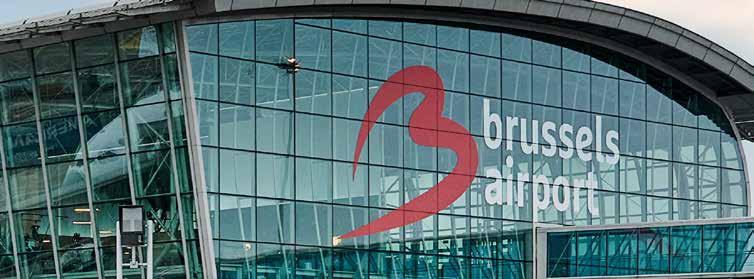




“ We connect people, businesses and communities in the heart of Europe and create prosperity and well-being.”
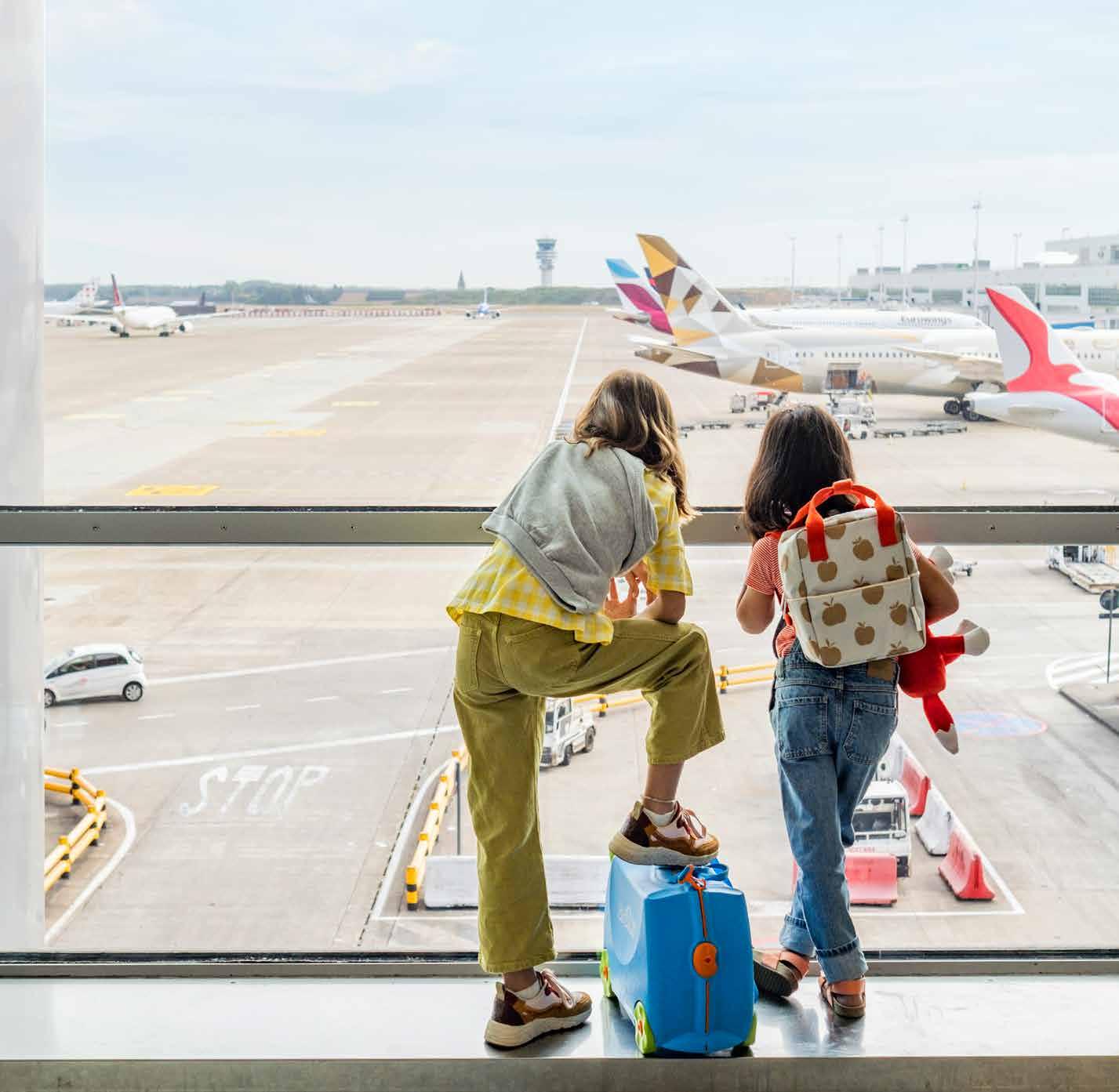
In 2023, Brussels Airport took essential steps to shape its future. We directly connected Belgium to 220 destinations worldwide, welcomed no less than 22.2 million passengers to our airport and transported 701,000 tonnes of goods. We want to continue strengthening our position as a central European hub today and tomorrow. Thanks to our central location in Europe, we are an important gateway to the world, and our expertise in the transport of pharmaceuticals, perishables, e-commerce and live animals positions us as one of the most attractive freight platforms in the region.
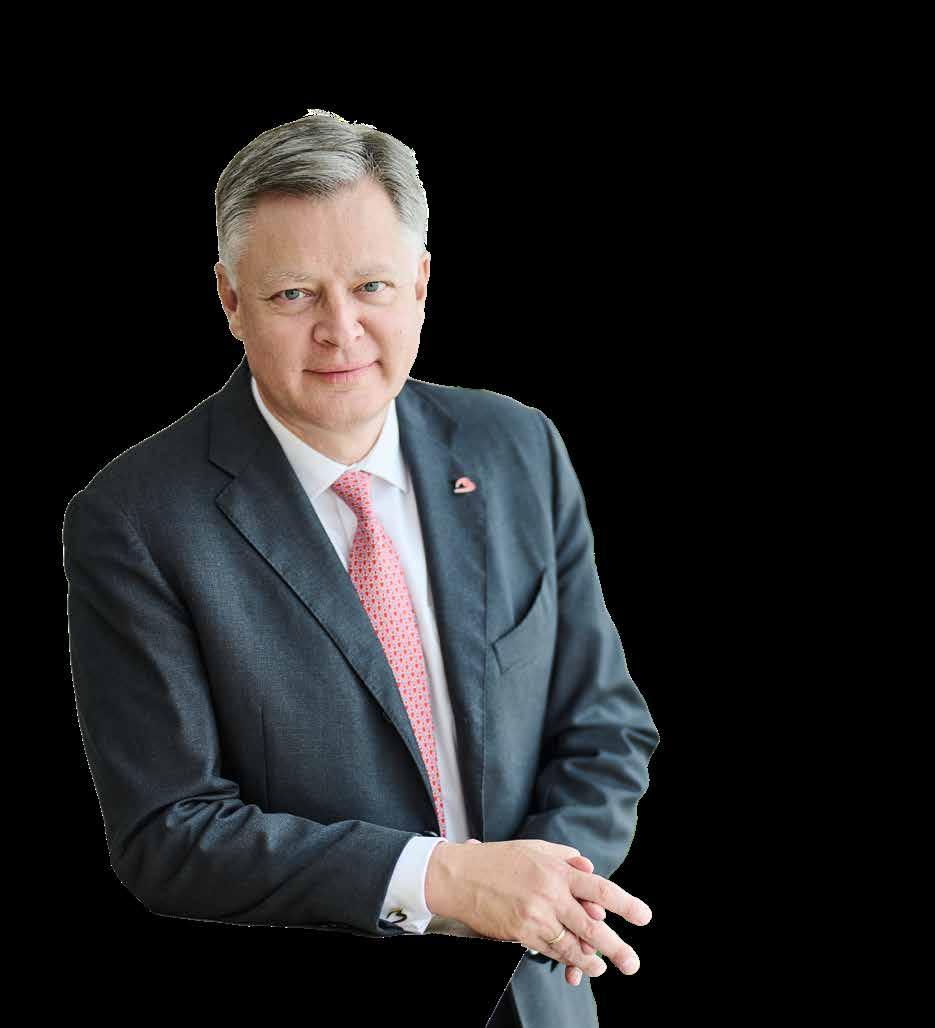
product, maintaining our position as Belgium’s second economic engine. With over 350 companies operating at the airport, Brussels Airport is also a key centre for investment, innovation, and dynamism. This is reflected in the 64,000 direct and indirect jobs generated by the various activities in our constantly evolving ecosystem.
value as an incubator and testing ground for innovative solutions. We invest in the future and choose to be even more sustainable in everything we undertake.
The trust that travellers and businesses place in us is essential not only for the future of Brussels Airport but for all of Belgium.
Our airport creates an annual total economic impact of €8.8 billion, about 2% of gross domestic
To keep our engine running and maintain our position as an economic growth pole, we made many investments in various areas last year, always with an eye on sustainability and innovation. For example, we focused on modernising and reorganising our cargo zone and entered into new partnerships with groundbreaking companies that support Brussels Airport’s agility and growth, such as DronePort in Sint-Truiden. We also announced our participation in Flanders Technology & Innovation, where we can offer substantial added
In 2023, our major milestone was the decision to become Net Zero Carbon for our own activities as an airport operator by 2030 at the latest, accelerating our 2050 target by twenty years. We actively contribute to the transition towards a more sustainable aviation and take on our role as a responsible local player. For example, we will replace our natural gas powered central heating system with heat pumps, which will be the largest of their kind in Belgium. Moreover, additional solar panels will be installed on the airport grounds, and we will keep investing in the production of green energy.
In 2023, we applied to the Flemish government for a new environmental permit, which
was granted in March 2024. An independent environmental impact report demonstrated that we can continue growing organically in line with the economy and market demand while lowering noise pollution. Moreover, the new airport tariffs came into effect, encouraging airlines to deploy modern and quieter aircraft. We also launched a fund that supports local and sustainable initiatives.
Because we strongly believe in the power of collaboration, we constantly join forces with various parties – from universities and companies to institutions and even the public. With our partners in the Stargate project, for example, supported by the European Union as part of the Green Deal, we make a tangible contribution to research and innovation initiatives that try to answer this question: How do we accelerate sustainable aviation? Strengthened by the power of its
collective and especially by the employees who make the heart of this unique ecosystem beat, Brussels Airport Company has taken many steps to bring its five-year strategy, Shift 2027, up to cruising speed. This activity report provides insight into our approach and ambition. It shows how we, as an airport, invest in sustainable development, balancing social, economic, and environmental aspects. We keep improving our customers’ experience, increasing operational efficiency and further diversifying our activities. This is how we are building the airport of the future together.
2023 in key figures
705
22.2 million passengers

€8.8 billion
The airport contributes a total of €8.8 billion to the Belgian economy and is an important employment pool.
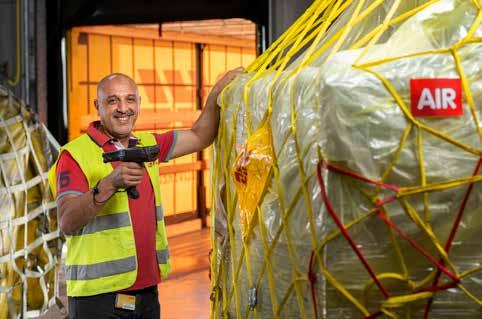
2nd largest economic growth engine of the country of GDP
1,056 employees on 31 December 2023 at Brussels Airport Company
56
701,000 tonnes of cargo handled Reference year 2019
29,500 direct jobs Our operations account for: 2%
34,500 indirect jobs
29%
71% male/female ratio
357 companies at and around the airport
3 days education and training
• Sustainable Aviation Fuel (SAF) flows to the airport quickly and eco-friendly via the NATO pipeline; Brussels Airlines operates the first SAF flight.
• Opening of a new bike parking facility where airport staff can securely park their e-bikes, scooters, cargo bikes, or speed pedelecs and charge them for free
• Two new passenger bridges, which make boarding and disembarking easier and more comfortable, are inaugurated at Pier B.
• In the airport’s North zone, Brussels Airport Company lays the foundation stone of the ultra-modern building where Safran Aircraft Engine Services will maintain and repair aircraft engines. It will be one of the most energyefficient structures in the entire cargo area.
• With its participation in DronePort, an innovative knowledge centre and incubator for the unmanned aviation sector based in
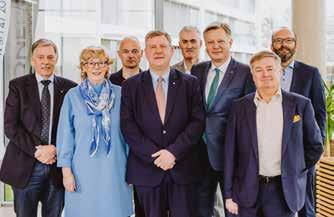
Sint-Truiden, Brussels Airport Company wants to strengthen its role in developing solutions and services based on drone technology.
• BRUce, the chatbot that guides travellers through questions and information, is voted ‘The Number One Bot in Belgium’.
• New airport tariffs go into effect, making the noisiest, most polluting aircraft that land and depart at Brussels Airport pay up to twenty times more than the quietest and most modern ones.
• Inauguration of the new bicycle bridge over the Haachtsesteenweg. From now on, commuters can cycle even faster and safer from Vilvoorde to the cargo area.
• Brussels Airport Company is taking steps to replace its central heating system with a fossil-free installation, allowing it to reduce its CO2 emissions by 70% by 2027.
• Brussels Airport Company, in cooperation with the King Baudouin Foundation, launches the Brussels Airport Fund. It will stimulate small local actions and initiatives that make a positive difference in the surrounding area.
• All runways and taxiways are continuously inspected to guarantee safety and operations. After a thorough inspection, the airport decides to carry out work on runway 25L/07R
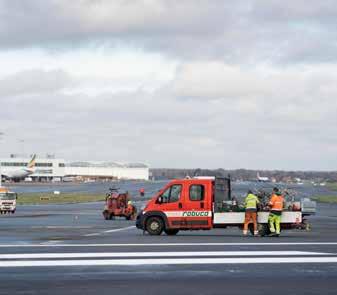
• By transporting festivalgoers to and from Paradise City with its electric buses, Brussels Airport Company contributes to the sustainable mobility plan of Belgium’s greenest music festival.
• During the annual plane spotters’ day, aviation enthusiasts have the opportunity to photograph aircraft up close, visit the airport’s fire station, and tour the inside of a DHL cargo plane.

• In September 1988, exactly 35 years ago, Singapore Airlines Cargo launched its operations at Brussels Airport, making it the longest-operating cargo airline at our airport.
• 430 colleagues from across the airport community take part in the Brussels Airport Marathon, Half Marathon and Mini Marathon. With 12,600 participants, this is a record-breaking edition.
• Brussels Airport hosts the International Air Cargo Association TIACA Executive Summit, a multi-day event where cargo players from all over the world gather in our Skyhall to network, debate and present products.
• A full-scale emergency drill with 450 participants takes place at Brussels Airport. It is organised together with the Federal Emergency Planning Department of Flemish Brabant, all intervention services, and external partners.

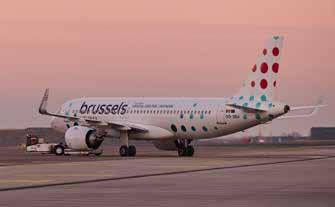
• Brussels Airlines’ new Airbus A320neo, the first of five aircraft announced, takes off from Brussels Airport to Vienna. A milestone in sustainability, as the A320neo consumes less fuel, emits less CO2 and produces 50% less noise than older comparable aircraft.
• Brussels Airport Company sets up the Flanders Technology & Innovation (FTI) platform with the Flemish government and six other companies. In the coming years, the partners will pool their know-how, innovative ideas and data to develop tangible solutions for societal challenges.
• Thanks to support from the federal government, Brussels Airport Company can make a financial contribution to encourage the use of Sustainable Aviation Fuel (SAF) among airlines
Brussels Airport, operated by Brussels Airport Company, is a living ecosystem of more than 350 companies and organisations that provide – directly and indirectly – tens of thousands of jobs in essential services. This makes us the second most important economic engine in Belgium. Our shareholders are the private consortium BAISA (75%) and the Federal Participation and Investment Company SFPIM (25%).

Thanks partly to our location in the heart of Europe, we are an essential gateway for travellers, businesses and our country’s numerous international institutions. Moreover, we are a people-sized passenger airport and a logistics centre, where safety remains the top priority in all operations and activities, and sustainability plays an increasingly important role.
Getting passengers and cargo to their destinations as smoothly as possible by air remains the core of our service. To this end, we continuously maintain and optimise our airport infrastructure but also invest in digital technologies, strengthen our flight network, and strive for higher punctuality.

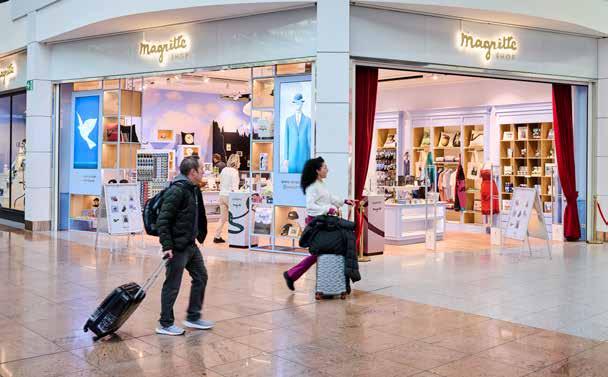
At Brussels Airport Company, our passengers always come first. Whether they want to shop, eat or drink before departure, we give them a taste of everything that makes Belgium unique. Furthermore, we continuously work on their experience: we pay special attention to people with reduced mobility, develop a chatbot that answers traveller questions at lightning speed, and optimise all procedures that guide them smoothly through the terminal.
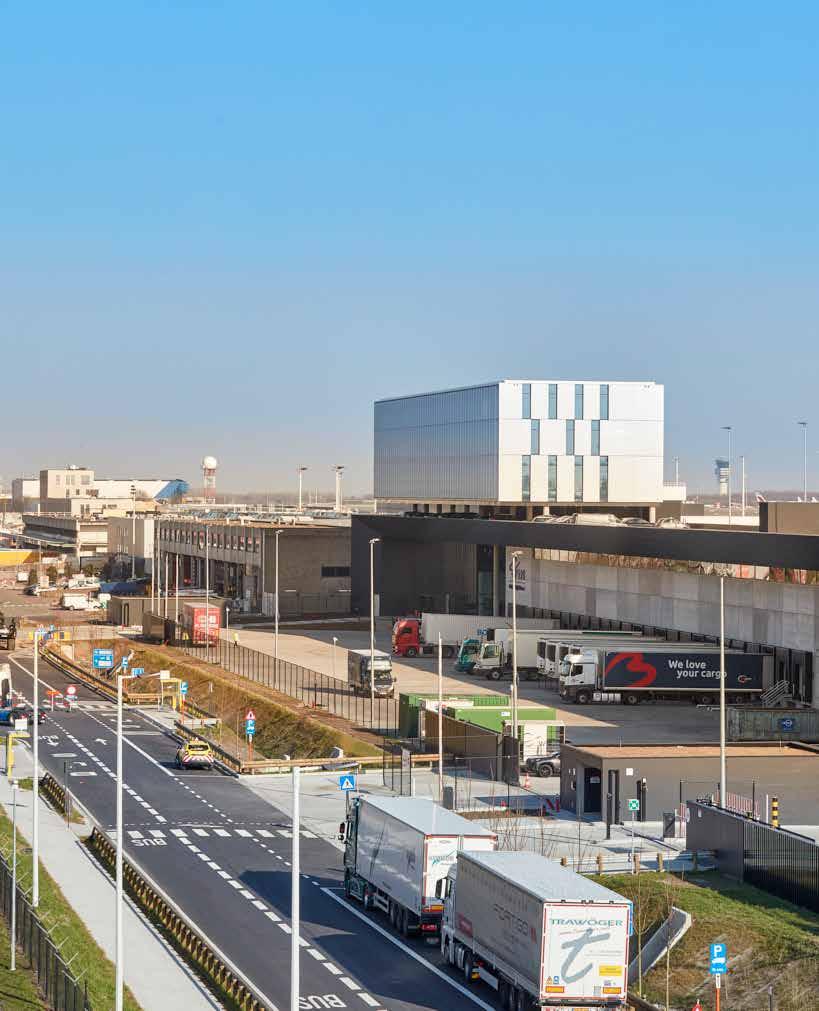
As we want to provide a safe and inspiring working environment for our direct and indirect employees, as well as diversify our activities, we continued to invest in modernising our cargo zone in 2023. With our real estate developments, we also give companies the opportunity to locate here, invest and strengthen the airport ecosystem.
Brussels Airport Company is investing in innovation to be even better prepared for the future. For example, the airport partners with players specialising in drones and artificial intelligence, and shares its knowledge in operational processes and data-driven decisions. Furthermore, Brussels Airport is an incubator and testing ground for other companies developing innovative ideas.
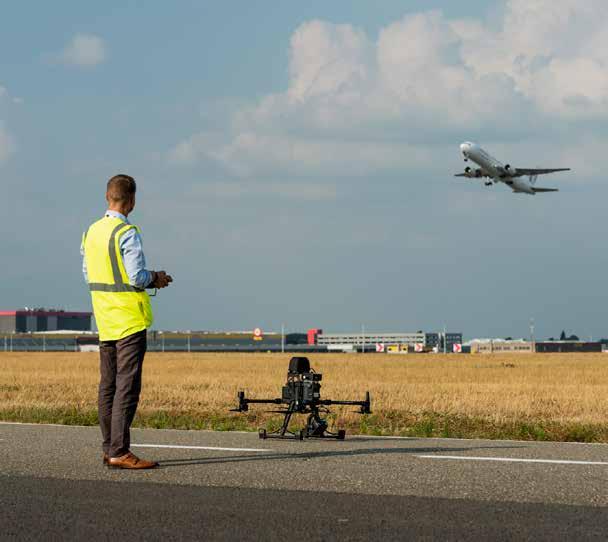
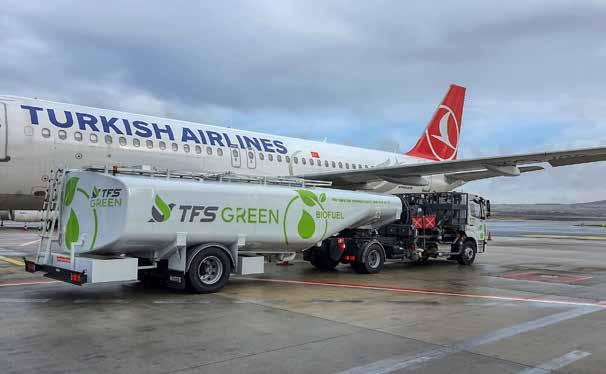
Brussels Airport Company is committed to various initiatives that ensure the sustainability of its activities and respect for people, the environment, and the surroundings. Furthermore, the airport takes the lead in making the entire aviation sector more sustainable, for example, by promoting the use of sustainable aircraft fuels.
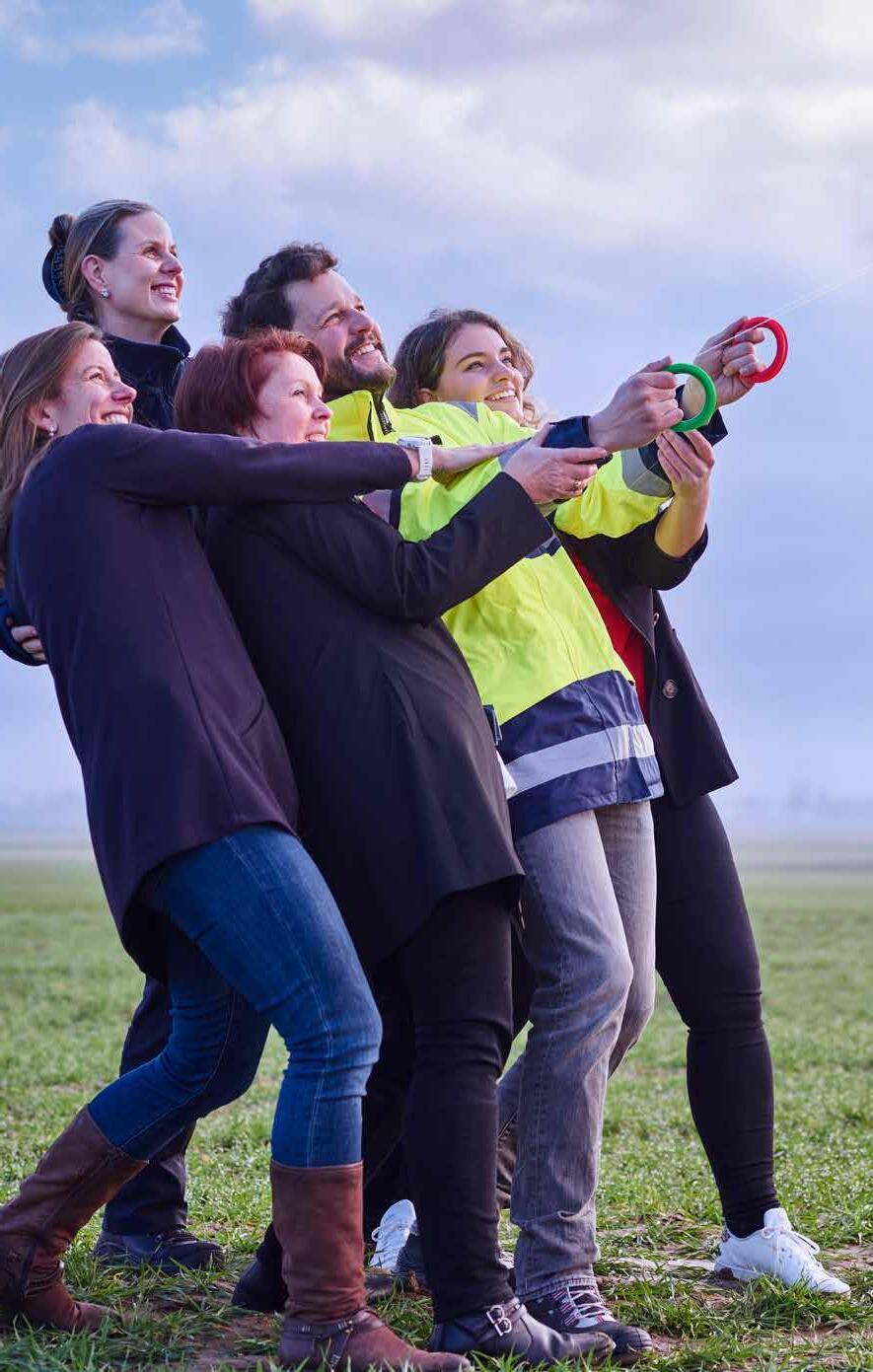

Our Shift 2027 strategy, launched in 2022, is now in full swing. With this multiyear plan, we have a clear goal: to further strengthen our position as a major European hub, ambitiously commit to sustainability and further diversify our activities with a focus on innovation and cooperation.
We strive for the best possible experience for our passengers and all other customers. Therefore, we expand our flight network and focus on connections with different modes of transport. Moreover, we continuously improve all processes by focusing on technology, data, and digital solutions and by working closely with our partners.
As we are more than just an airport, we continue diversifying our activities. For example, we make extensive investments in our cargo area and related infrastructure, as well as in real estate developments and logistic activities. Offering exclusive event venues fits this picture, as does our participation in forwardlooking, innovative companies.
Sustainable in everything we do
The future of aviation must and will be sustainable. In 2023, we took additional measures to reduce our ecological footprint and improve circularity and the living environment at and around the airport. For instance, we apply differentiated airport tariffs to encourage airlines to use more fuel-efficient aircraft, invest further in renewable energy, and continue to strive for an inclusive and diverse corporate culture.
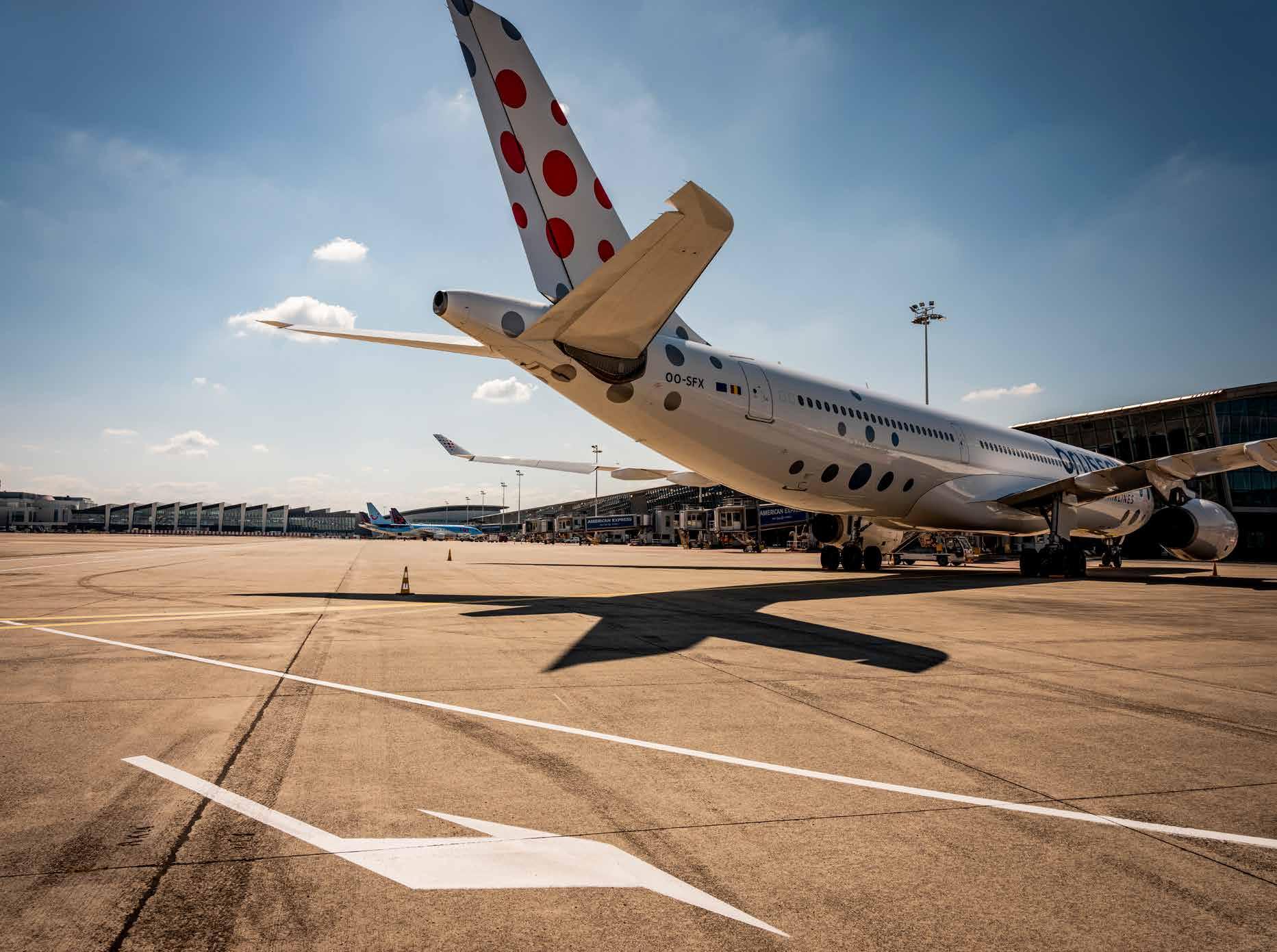
Brussels Airport is an important hub in Belgium and Europe and a gateway to the rest of the world.
We continue to develop and refine our many qualities in this area so that all our passengers and customers can count on us – today and in the future.
With its wide range of intra-European and long-haul flights, Brussels Airport connects holidaymakers and business travellers to more than 181 destinations.
By connecting people and businesses to dozens of – sometimes unique – destinations worldwide, Brussels Airport makes a positive contribution to society. Regardless of why people fly, thousands of airport staff work together to make sure they get to their destination. A quarter of our passengers belong to the VFR or ‘visiting friends and relatives’ segment – by travelling abroad to meet their friends and relatives, they remain part of each other’s lives. But because of its central location, in the very heart of Europe, Brussels Airport is also a vital hub for the many thousands of companies and organisations in the region: they rely on the airport to get staff and goods to their destination.
After Washington, Brussels is the second most important diplomatic hub in the world, so the airport is an essential link for those who work in aid and diplomacy. For this reason, Brussels Airport continues to strengthen its flight network.
Busiest day of the year 31 JULY 2023
6. Lisbon 534,200
7. Frankfurt 527,900
8. Malaga 509,100
9. Canary Islands 502,500

Restored route between Singapore and Brussels
“After a 21-year break, Singapore Airlines is resuming commercial flights between Singapore and Brussels. Our Airbus A350 aircraft, known for its low-noise operation and energy efficiency, will operate four weekly flights to the heart of Europe. This service caters to the increasing demand from holidaymakers and business travellers visiting the numerous governmental institutions in both cities. Additionally, this connection between two major global gateways opens many travel options for passengers flying to or from other destinations in Southeast Asia or the Pacific. Thanks to Brussels Airport’s dedicated support and encouragement, we have completed all necessary preparations throughout 2023 and are ready for a smooth operational launch in April 2024.”
Milan 500,400 141 average number of passengers/flight
— CHRISTIAN STENKEWITZ General Manager Benelux, Singapore Airlines


527 average aircraft movements/day in 2023
Weekly flights to Kenya strengthen the Africa network
“Kenya not only attracts two million tourists annually, but it is also home to many companies and international institutions, including the United Nations and the World Bank. Thanks partly to the Silicon Savannah technology ecosystem, Kenya is an economic success story as well, having grown to become the third largest market in the Sub-Saharan region in recent years. To respond to the growing potential of passengers between Brussels and the Kenyan capital Nairobi, Brussels Airlines decided in 2023 to fly between Brussels Airport and Jomo Kenyatta Airport from June 2024.”


— COLINE EVERARD Head of Network Africa, Lufthansa Group
Brussels Airport is an important gateway to Europe and the rest of the world for Belgian residents. Next to that, the airport aims to attract travellers from the south of the Netherlands and the north of France by demonstrating its extensive network and interesting services. “Brussels Airport is only one and a half to two hours away from the Netherlands. It is not that far away, but we notice that the Belgian border remains a symbolic barrier for many Dutch travellers”, says Senior Market Development Manager Betty van de Nobelen “Once they had the chance to experience Brussels Airport, they are convinced and will choose our airport more frequently in the future.”
Brussels Airport highlights all its strengths to travel agents in the south
of the Netherlands by visiting them and giving short presentations, or by running workshops with travel agents. Moreover, it launches numerous regional advertising campaigns on social media, radio and in print, among others. “Our story of course revolves around our strong flight route network,” Betty van de Nobelen continues, “but we also focus on our services, the comforts in our airport and the easy accessibility.”
In northern France, the team in 2023 zoomed in on the region around Lille. Here, in addition to running advertising campaigns, they informed travel agents about the latest novelties at Brussels Airport, thereby increasing its market share.
“The more sharply we focus on specific target groups, the more effect

we see”, adds Betty van de Nobelen. The airport has seven of those target groups, one of them being the Belgian-Moroccan traveller. With a targeted campaign, we managed to reach BelgianMoroccan travellers who want to visit family and friends in their homeland. In short online videos, well-known and lesser-known Moroccan Belgians talked about their ties with Morocco, while the slogan ‘Your Morocco moment starts at Brussels Airport’ reinforced their story. By working with the airlines Air Arabia, Brussels Airlines, Royal Air Maroc and TUI fly, all of which have a growing flight offer to Morocco, the number of bookings increased.
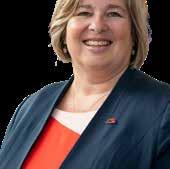

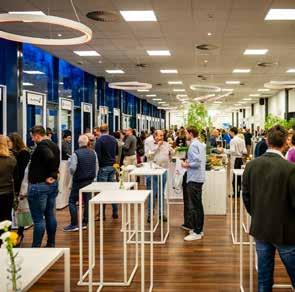







Brussels Airport Company works closely with three tourist boards, Visit Brussels, Visit Flanders and Visit Wallonia, to promote Belgium and its regions. “Out of this collaboration, the Hello Belgium website came into being. It’s an online platform meant to inspire tourists from all over the world to take a trip to our country”, says Tania Ter-Ossepiantz, Senior Aviation Marketing Manager. “For that purpose, we invite foreign travel operators and agents, as well as the press, to come to Belgium to learn about our country’s many assets.” In 2023, for example, Brussels Airport Company and its partners focused on Japan. Together with All Nippon Airways,
they worked out an activity plan to familiarise the Japanese with our country. “It is important that we speak with one voice, tell one consistent story and work out one concrete plan together”, says Vincent Schepens, Business Development Manager at All Nippon Airways. “This approach has worked out particularly well. We had a kick-off meeting in Japan in March 2023, and a Hello Belgium stand at the important Tourism Expo Japan fair in Osaka in October. Furthermore, we invited Japanese travel agents to visit Belgium. The feedback received in response to this initiative was overwhelmingly positive. As a result, in 2024, we will progress to the next phase by introducing
comprehensive vacation packages explicitly tailored for Japanese tourists.”
Not only does Brussels Airport Company join forces with the tourism boards, but we also actively cooperate with embassies, Chambers of Commerce, Flanders Investment & Trade, AWEX, hub.brussels and the Belgian Foreign Trade Agency. Together, we organise workshops, invite influencers or business partners to Belgium and invest in projects promoting Belgium as a tourist destination.




Companies looking to transport goods by air can rely on Brussels Airport’s know-how and expertise. Thanks to our digital processes, niche focus, and the strength of our community, we are known as a unique cargo ecosystem where freight is handled in the shortest possible time in a safe, efficient and sustainable way.
In 2023, 700,846 tonnes of cargo passed through Brussels Airport. A decrease of 10% compared to 2022, but still a high volume, especially considering the global trend and geopolitical situation. In all respects, we did better than other European airports
By strategically specialising in four focus segments, we have built a reputation as a reliable long-term partner: for e-commerce players and companies transporting perishable goods or live animals, but especially for the solid Belgian pharmaceutical industry that sees Brussels Airport as Europe’s most important pharma hub
With Air Cargo Belgium, Brussels Airport Company works daily with all these partners towards one common goal: to further develop the cargo area into the most attractive, efficient, innovative and successful cargo platform in the region. “Rather than just erecting buildings and then attracting the necessary cargo companies, we aim for far-reaching and active cooperation with all stakeholders. After all, it’s the key to creating a rocksolid product”, says Geert Aerts, Chief Cargo & Real Estate Officer and chairman of Air Cargo Belgium
Everyone who plays a role in shipping goods at Brussels Airport – including
airlines, forwarders, handlers, truckers and government bodies – works together on various topics and projects that transcend individual interests. For example, Air Cargo Belgium set up a working group to collect feedback on the needs and interests of the cargo community regarding digitalisation and sustainability, and then they developed Digital Green Lane in collaboration with the airport. This procedure was launched in 2022 and facilitates the transfer of goods between forwarders and ground handlers. A digital booking system replaces paper-based processes and optimises the flow, reducing truck waiting times and allowing ground handlers to schedule their staff better. “Digital Green Lane thus not only makes the whole procedure more efficient and transparent but also reduces CO2 emissions. With initiatives like this, we can distinguish ourselves as an airport and a community”, says Freek De Witte, director of Air Cargo Belgium
In the field of operational excellence, Air Cargo Belgium and its partners also take initiatives to tighten up processes so that freight forwarders know they can always count on Brussels Airport. Attracting and keeping talent is another important


focus: the organisation works closely with Aviato and Aviato Academy on the issue.
“Air Cargo Belgium often takes the lead and launches pilot projects together with Brussels Airport Company, and as a result we can respond much faster as a sector”, Geert Aerts continues. In 2023, for example, a test was prepared with RFID tags: by attaching radio-wave reactive chips to boxes of goods, a ground handler can count dozens of them in one go instead of scanning them individually. This saves time but also reduces the margin of error.
The idea of an Air Cargo Belgium intern led to a proof of concept in which one truck picks up loads from several handlers – in the past, each handler sent their own driver. Because this ‘Cargo Run’ improves operational efficiency and is more sustainable, Air Cargo Belgium will develop this idea further and put it into practice.
“Finally, we also want to be the binding agent between all members of the cargo community”, says Freek De Witte. “We want to spread the word that the cargo zone is a great place to work, which is why we set up inspiration sessions or events aimed at young talent. With our annual ACB


Awards, we recognise players who have embraced the organisation’s philosophy over the past year. By connecting locally, we strengthen Brussels Airport’s role in the global cargo community.”
700,846
TONNES OF CARGO HANDLED
27 cargo airlines
47 passenger airlines Our
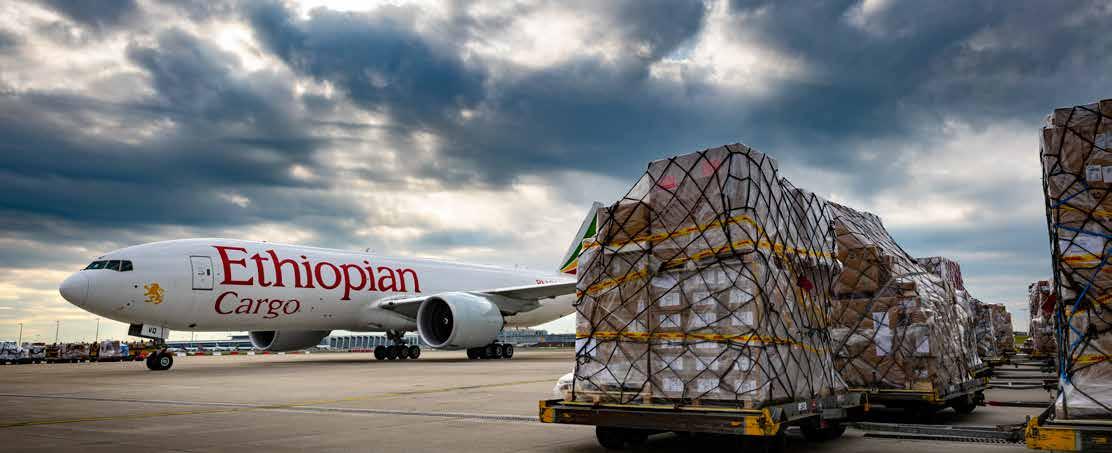


Our airport is not just an important gateway for medicines and other life science products, it is also the crucial jigsaw piece that makes the Belgian pharma ecosystem complete. “As a logistics hub, we are the vital connection between local pharmaceutical research and production facilities on the one hand, and millions of patients around the world on the other”, says Samuel Speltdoorn, Senior Cargo Business & Network Development Manager and board member at Pharma.Aero. “Because those often
life-saving products have to arrive in perfect condition, we continuously share our know-how regarding safety and regulation with the rest of the industry.” It’s what we did, for example, in September 2023 during our Pharma Logistics Masterclass
At this multi-day event in Singapore, organised by Pharma.Aero and the University of Antwerp, all the world’s logistics players came together to share knowledge and the latest innovations, to later implement them in their operations.
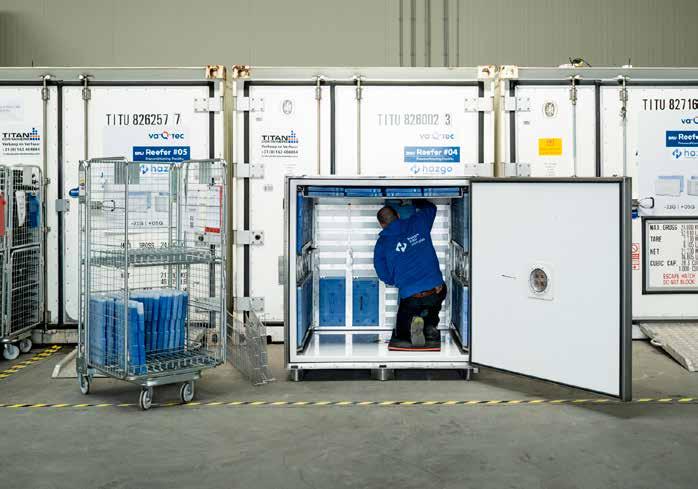
“As the world’s leading animal health company, we rely on Brussel Airport’s exceptional services to transport our key products to and from the heart of Europe. With their continuous investments and customer-focused mindset, they helped improve pharmaceutical logistics services, and thanks to their efforts in connecting the right stakeholders within the industry, we are able to keep growing and improving.”
— GERGELY SZORCSIK Director Global Distribution, Zoetis




Vegetables, tropical fruit, nuts, meat and fish from different continents arrive daily in Brussels Airport’s cargo area. But we are also an important European hub for flowers, and we offer airlines all the support they need for the transit of these perishable goods. Take Qatar Airways Cargo, which has been flying fresh flowers twice a week from the Ecuadorian capital Quito to Brussels since 2023. “In South America and in Africa, flowers grow all year round,” says Mark Drusch, Chief Officer Cargo at Qatar Airways Cargo, “but of course you have to get them fresh to Aalsmeer, the location of Europe’s largest flower auction. That is, as soon
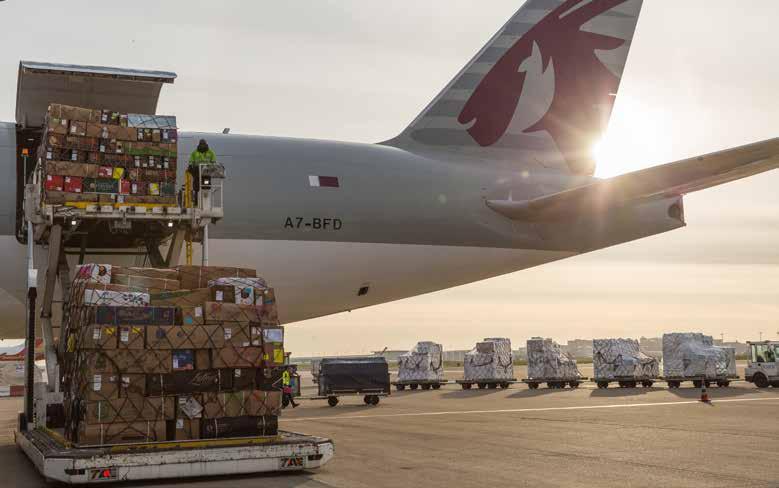
as possible.” In February 2023, during Berlin’s international trade fair Fruit Logistica, Qatar Airways decided to set up a test flight with flowers between Quito and Brussels. The cooperation between airline, customer, handler and airport was a success from the start. “When transporting perishable goods, the shortest possible handling time is of the utmost importance.
Brussels Airport Company’s cargo team has been an indispensable link in our cooperation with the FASFC and the customs services to ensure fast handling, so that our flowers remain as fresh as possible.” Since then, two Boeing 777Fs of Qatar Airways Cargo, the most economical among all cargo planes, have been leaving Quito for Brussels Airport every week – accounting for 1,600 tonnes of flowers per week. Moreover, Brussels’ central location ensures that flowers arriving at our airport quickly reach their destination in the Netherlands.
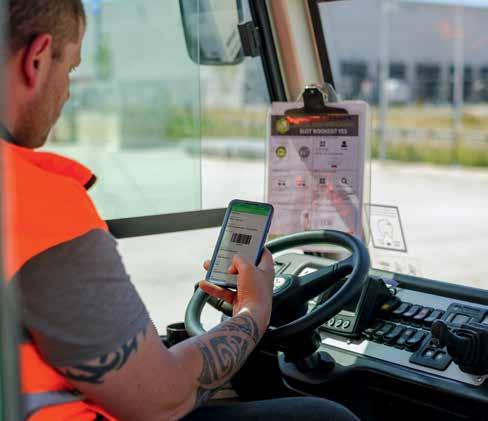
More efficient and transparent controls thanks to digital application


Since spring 2023, the control of perishable goods at Brussels Airport has been entirely digital, thanks to the Perishable Management App (PMA) developed via BRUcloud. “Previously, lots of paper documents had to be checked and signed for each perishable shipment, and ground handlers had to physically hand them over to the importers and the Federal Agency for the Safety of the Food Chain (FASFC)”, explains Sam Quintelier, Senior Cargo Business & Network Development Manager Today, the importer automatically sees in the app when the cargo has arrived and the FASFC check has been completed. These are significant advantages, and in 2023, they made Ostend-Bruges International Airport and Port of Antwerp-Bruges decide to implement this digital solution, too.
As an airport, we continue to respond to the changes and growing potential in the e-commerce sector. We focus on sustainability and offer the companies in our cargo area, among other things, direct access to planes, state-of-the-art warehouses and digital platforms so that they can process goods quickly and efficiently. Our partner DHL sends a large volume of regular parcels every day through Brussels Airport, but in recent years, it has also specialised in handling crucial shipments for companies around the world, says Public Affairs Director Lorenzo Van de Pol “We increasingly work for big players who want to offer their customers the opportunity to order something at the very last moment of the day with the guarantee that it will be delivered to them
48 hours later.” For example, for TVH, a global specialist in machine parts with a large warehouse in Waregem, DHL offers the flexibility to bring shipments to its Brussels Airport hub until late at night. “Suppose you are a major player in the logistics sector, but a forklift truck in one of your warehouses suddenly breaks down. Then, of course, you want to be able to replace the broken part as quickly as possible, preferably tomorrow. Because we are perfectly attuned to the service that TVH offers to its customers, that particular logistics player usually receives its part the very next day.” DHL also sends other goods that require careful handling: blood samples, clinical medicine trials or other vital shipments. For DHL, Brussels Airport’s central location is of course


one of the main advantages, but the strong Africa network of Brussels Airlines also offers benefits, says Lorenzo Van de Pol: “We often have to send goods to Africa, but for small quantities, we first check if we can send them on a Brussels Airlines passenger flight: it’s more efficient and more economical than using one of our own aircraft”. Thanks to collaborations like this, Brussels Airport can strengthen its role as a hub.



Companies ship raw materials and finished products via our cargo area, but we are also a hub for live animals. At the Animal Care & Inspection Centre (ACIC) at Brussels Airport, animals can wait peacefully and with the best care before or after a flight. Naturally, many dogs and cats pass through, but ACIC has also accommodated many exotic species: sea lions, koalas, zebras, servals and a hippopotamus. To transport horses safely and without too much stress from and to foreign countries, companies and agents increasingly call on ACIC’s expertise, says coordinator Ann Goovaerts “Our centre is perfectly equipped to give temporary shelter to horses, and our people manage the procedures down to the smallest details. If we get a request to transport horses abroad via Brussels Airport, the team immediately starts with all the preparations. Their first task is to ensure we have enough mobile stables in perfect condition. Some airlines have stables of their own, but often, they have to fly them in from abroad. But because these items are constantly being flown around the world, now and then, one is in bad shape. And you can’t put a horse on
an aeroplane if, say, the stable door is missing, so a proper check beforehand is essential for the animal’s safety and comfort.” The ACIC staff then prepares the stables for departure by adding wood shavings to absorb moisture during flight, and by placing hay nets and providing jerry cans or buckets of water for the animals to drink. Once the horses arrive at ACIC, they are held until all the customs documents are in order and the animals are weighed, after which the team accompanies them to the aeroplane.
Animals landing at Brussels Airport follow more or less the same procedure in the opposite direction – they often rest in the import stables at ACIC until travelling on to their final destination.
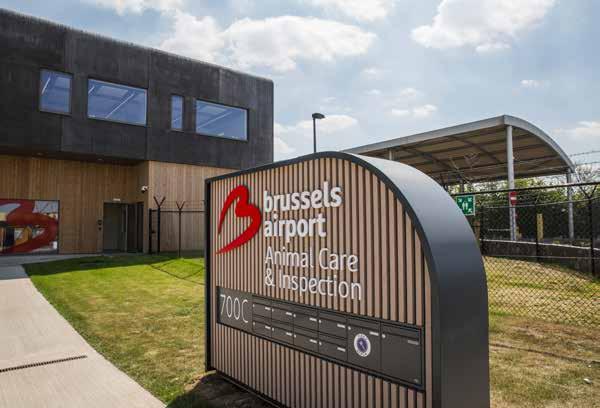
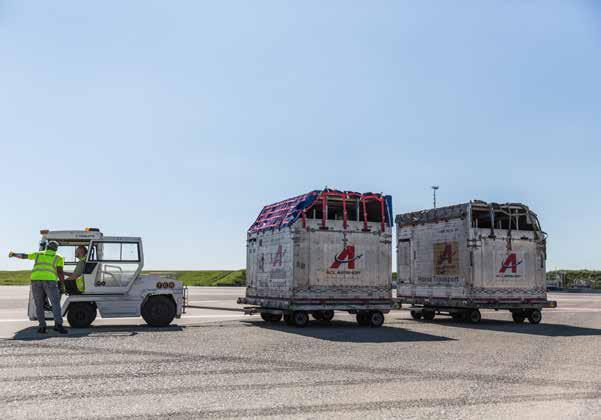

To ensure that Brussels Airport is easily accessible and that our passengers and visitors more frequently opt for sustainable mobility solutions, we have improved signage and continue to work closely with various mobility partners.
Smoothly to and from the airport thanks to improved signage


Brussels Airport Company helps passengers find their way to the airport as smoothly as possible. Even those who have just landed receive transport information on the shortest route to their final destination. “We want to inform everyone as best we can on the different transport modes, stops and destinations,” says Silke Devacht, Senior Product Development Manager, “but always with one eye on our ‘moving minds and modes’ philosophy. We have to change our travellers’ mindset so that they don’t automatically go for private transport or a taxi, but also consider alternatives such as public transport. The threshold for that choice should be as low as possible.”
Brussels Airport Company, therefore, introduced clearer signposting in 2023: when travellers pick up their bags, they immediately know where to go to take a train or bus. In the arrival hall, they can read all information from De Lijn, STIB, SNCB and intercity bus companies such as Flibco. com in real time from a large dynamic screen. Following tests with a mobility information point at a strategic
location in the baggage reclaim hall, we are now working on a permanent solution – a place where travellers can drop by with all their questions about public transport. In addition, we guide motorists to the right car park thanks to dynamic signage, and drivers who drop someone off no longer need to take a parking ticket. Moreover, thanks to number plate recognition, queues at the exit of the drop-off zone are shorter, and there is less paper waste.
“By constantly fine-tuning initiatives and coming up with new ones, we make Brussels Airport ever more accessible to our passengers and visitors”, concludes Silke Devacht.
Brussels Airport is actively developing new routes to offer travellers the widest possible range of fast public transport connections. “We carry out studies and analyse data to determine where there are opportunities and shortcomings. Then, we discuss them with mobility partners such as SNCB or Flibco.com, who can fill the gaps in the network”, explains Mobility Services Development Manager Marnix Wouters. With SNCB, Brussels Airport Company is, for example, looking

into the feasibility of using direct trains to and from specific cities so that travellers from those regions no longer have to change trains. The airport also works closely with shuttle bus company Flibco.com to set up direct connections, allowing passengers to catch the earliest flights stress-free and on time. These consultations resulted, among other things, in the new Tilburg-Breda-Antwerp-Brussels Airport route, which started in April 2024. By better matching ground transport schedules to that of flights,
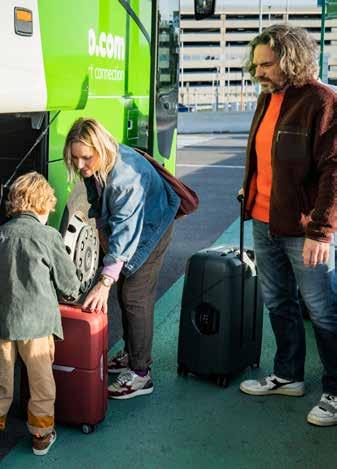
we make Brussels Airport even more attractive for our passengers.
On time at the airport thanks to car sharing
Travellers from large cities can easily opt for a shared car to drive to the airport. Since they can share the costs and leave the car here, they are increasingly doing so. Brussels Airport Company is also happy to support this ‘green’ model. To facilitate this experience as much as possible, the airport collaborates with three car-sharing providers: Poppy, Miles Mobility, and UFODRIVE.
In 2023, we recorded at Brussels Airport:
104,676 train movements
225,714 bus movements (De Lijn and MIVB)
13,500 intercity bus movements
650,000 shuttle bus rides
470,000 taxi movements
167,000 rental car movements


“ Thanks to our collaboration with Brussels Airport Company, we can make Poppy a completer and more attractive alternative to owning a car. It allows us to reach a wide audience and to focus extra on off-peak hours when transport options to and from the airport are more limited.”
To improve our hub performance, we continuously optimise our procedures, focusing on efficiency and reliability for our passengers, airlines, logistics partners and all the companies in our buildings. As an airport, we continue to innovate and set up initiatives that help achieve this.


Chatbot BRUce: a unique digital travel companion that keeps everyone informed
Since 2018, anyone travelling via Brussels Airport can count on a unique digital travel buddy: BRUce, the airport’s chatbot. Day and night, BRUce answers passengers’ questions in the weeks or days before their departure – from “Where do I park my car?” to “Can I have a cup of coffee in the terminal?” He also informs them of their flight progress by sending notifications via WhatsApp or Messenger.

On departure day, BRUce guides them through the airport terminal as smoothly as possible via short text messages. Because of its ease of use and the speed with which BRUce answers questions, our chatbot was named the ‘Number One Bot of Belgium’ in March
“Thanks to BRUce, our passengers can set off on their journeys with peace of mind”, says Digital Channels Manager Anja Paermentier. “They no longer have to search for information on our website or through our customer care team, as BRUce helps them quickly and at any time of the day.”
“We constantly refine our approach so that we can send travellers tailor-made messages that take away their worries”, Digital Web Manager Stijn Verleye continues. In 2023, the team made BRUce focus
increasingly on unforeseen circumstances. If snow is on the way, for example, passengers following their flight will receive updates and practical tips from BRUce, so they know perfectly what to do. BRUce is also increasingly present in the terminal building to guide passengers digitally with useful information.


the best experience for our passengers


7.5 million messages sent in 2023
250,000 passengers followed their flight via BRUce
83% opted for WhatsApp notifications
17% opted for Messenger
At Brussels Airport Company, we do everything possible to make the experience for our customers and partners as pleasant as possible. The centrepiece of our approach is the Airport Operations Plan (AOP): with this tangle of initiatives and digital tools, we constantly monitor, analyse and refine the many dozens of processes at the airport, all with the help of data. “In 2023, we took many new steps that will benefit passengers, airlines and handling agents alike”, explains Laure Henriquet, Senior Data Product Owner. “Among other things, we implemented a new AI model which, based on the data we capture, more accurately predicts passenger numbers. It automatically produces better models in less time, reducing our workload in this area. The additional data our partner Brussels Airlines shares with us further improves the quality of our forecast reports.”
Other tools have been upgraded or better integrated into the AOP: a new planning tool ensures that passengers with reduced mobility can always count on a PRM assistant when they arrive at the terminal. With our capacity tool, we now better predict how many flights can depart during unforeseen circumstances such as snow, and we also share that data
with the systems of our partner skeyes now. Also in 2023, we started a proof of concept with airlines and ground handlers to collect objective data on the activities around an aircraft between arrival and departure. It will allow us to further optimise these processes in the future. We also improved and enriched our HELI application, which provides a real-time overview of numerous activities at the airport. By capturing more data on our travellers’ baggage, our partners can process it faster and more accurately. Finally, by further refining our Post-Ops dashboards, we can spot essential performance insights at a glance or get more details at the touch of a button, optimising the process further. “All these changes enable Brussels Airport Company to work even more closely with airlines and ground handlers, thus serving our passengers even better”, concludes Laure Henriquet.
For many passengers, waiting for their flight to take off involves a snack and a drink. In 2023, Brussels Airport Company further tailored the culinary offerings in the departure hall to the tastes of its travellers.
• YoYo! Fresh Tea Bar
• Dunkin’ Donuts
• Guapa Juice
• Java Coffee
• Starbucks
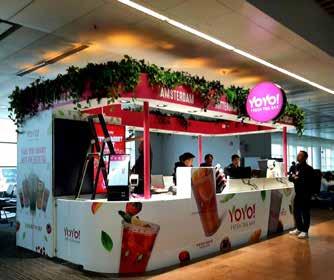
As a sustainable alternative to plastic single-use water bottles, Brussels Airport Company installed a water kiosk just after the security checkpoint in Pier A. Passengers can refill their reusable water bottles there for free, and those who did not bring their bottles can purchase a reusable bottle right there.
To meet the increasing demand for a premium airport experience, Brussels Airport Company gave the Diamond Lounge in Piers A and B an extensive makeover in 2023: with new furniture, refreshed colours and an atmosphere of Belgian hospitality, the airport aims for business travellers and families. Depending on their needs and wishes, they can work in peace in the lounge, take a shower, enjoy the extensive restaurant buffet or relax in the best conditions while waiting for their flight.
Also in Pier B, construction started on a larger lounge to replace the other two, which should eventually accommodate 350 passengers. Besides the classic lounge ingredients – a spacious and pleasant place to work, eat and relax – it will also include a separate area with showers, toilets and a sleeping area.
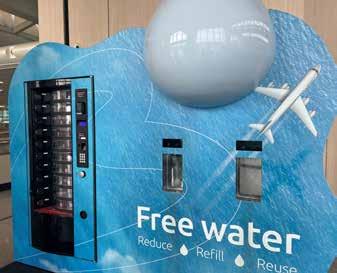
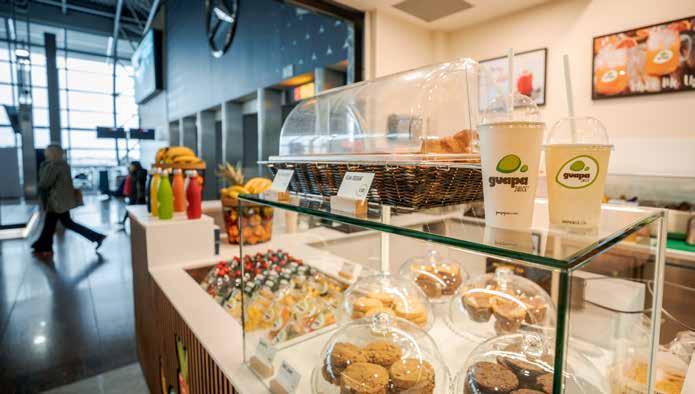

393,000 passengers used the Diamond Lounge in Piers A and B in 2023 (266,000 in 2022)
Every summer, Brussels Airport welcomes thousands of international festivalgoers on their way to the renowned dance festival Tomorrowland in Boom.
“Tomorrowland is a Belgian success story that connects people of many different nationalities and ages, so naturally, as an airport, we want to put our shoulders to the wheel”, says Senior Passenger Experience & Marketing Manager Cindy Mussche. Brussels Airport Company works closely with Tomorrowland to get festivalgoers, who often arrive on a Brussels Airlines party flight, to their hotel or campsite as


quickly as possible. After the festival weekend, they can enjoy some extra Tomorrowland atmosphere at Brussels Airport before their flight home. At the Beers & Cheers in Pier A, they can continue dancing to the music Tomorrowland DJs play from a decorated DJ booth. “Not only festivalgoers and other passengers are enthusiastic about this, but it also puts a smile on many faces in the whole community, from employees to suppliers”, says Cindy Mussche.
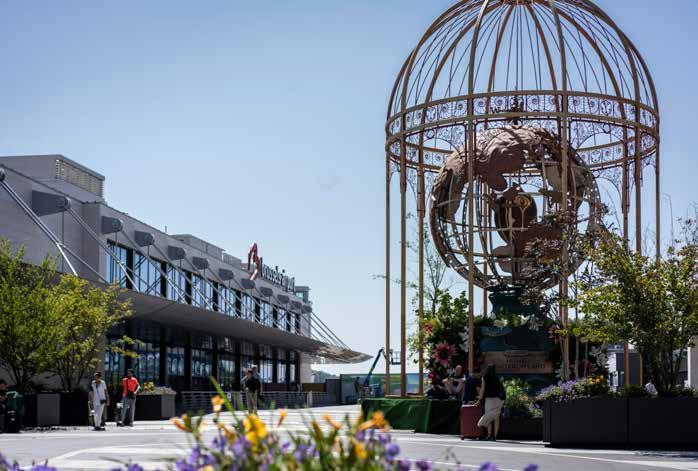
Throughout the year, Brussels Airport Company wants to get passengers to their destinations as smoothly as possible and make their short stay at the airport as pleasant as possible. Especially during summer, this requires extra effort. In July and August 2023, no less than 4.7 million passengers passed through our terminal. That is why every year we start the necessary preparations well in advance. Together with our departments and all our partners, we sit down and go over the processes. We pinpoint where minor or major adjustments are needed, where we can deploy new technology or how many extra staff we need to hire or train. In doing so, we aim for an optimal experience for everyone who takes off from Brussels Airport on holiday or business trip during the summer peak.
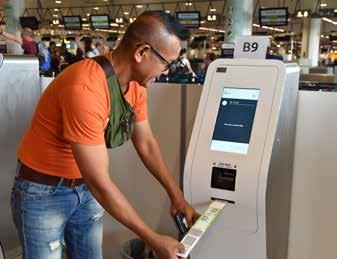
Passengers arriving at the airport often check in their baggage first.
A smart modification of ten label kiosks and six check-in counters just before the 2023 summer peak ensured passengers on flights operated by Brussels Airlines, Lufthansa, SWISS, and Austrian Airlines could self-check in much faster – on their own. Whereas it used to take two and a half to three minutes to have luggage labelled by an airport employee, they can now take care of it themselves in one minute.
During the peak month of July, passengers checked in 76,000 pieces of baggage through one of these label kiosks, one-tenth of all bags passing through the airport. The aim is to extend the project to all airlines and have three-quarters of all baggage checked in this way by 2028.

To make passport control more efficient and reduce passenger waiting times, in the summer of 2023, Brussels Airport Company installed three extra e-gates, automated border control gates that digitally check passports. Six of the total twelve e-gates are reserved for EU travellers, and the other six are for those holding US, Canadian or British passports.
In the second half of the year, there was a four-fold increase in the use of e-gates, significantly reducing the waiting time at border control.
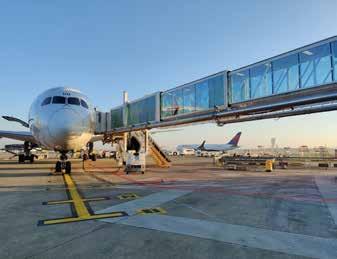
The airport is replacing 28 passenger boarding bridges in six phases; three new boarding bridges have been in use since the end of 2023. The renovation is part of the airport’s strategy to continuously improve the comfort of its partners, passengers, and airlines. The new boarding bridges are more spacious and enjoy plenty of natural light thanks to large windows. They also feature the latest technologies: a modern climate control system for heating, ventilation, and air conditioning, lighting sensors, and new information screens for an even smoother flow.
Summer may be the busiest period at Brussels Airport, but we operate at full speed during the winter months as well. At this time of year, freezing temperatures or snowfall can seriously hamper our operations. If snow is forecast, the team coordinators meet the day before with representatives of the Airport Operations Centre (APOC), the airport’s nerve centre, where all processes are constantly monitored and adjusted. Among other things, they decide which runways to use and how many staff they need to call in to keep runways and aprons free of snow and ice. If snow has fallen during the night, or if it starts snowing during the day, three teams of forty colleagues take turns keeping the tarmac accessible. In convoy, they drive around with sprayers and snowploughs while the coordinator communicates with the inspection team, the APOC and air traffic control. Salt spreaders then drive around individually, and they also take care of all access roads and the cargo area. Thanks to these measures, Brussels Airport can continue to operate in extreme winter weather.
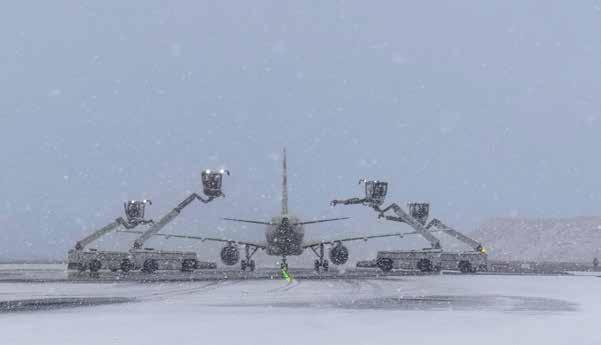
To keep the tarmac free of snow and ice in winter, Brussels Airport Company has:
22 SNOWPLOUGHS 14 large and 8 small
7 SPRAYERS the largest of which can spray 30 m wide
4 TANKS each holding 45,000 l of spraying agent
3 SALT SPREADERS
110 TONNES OF ROAD SALT in stock
3 SNOW BLOWERS the largest of which can blow away a load of snow up to 60 m away
150 EXTERNAL COLLABORATORS on call 24/7 between 15 November and 31 March
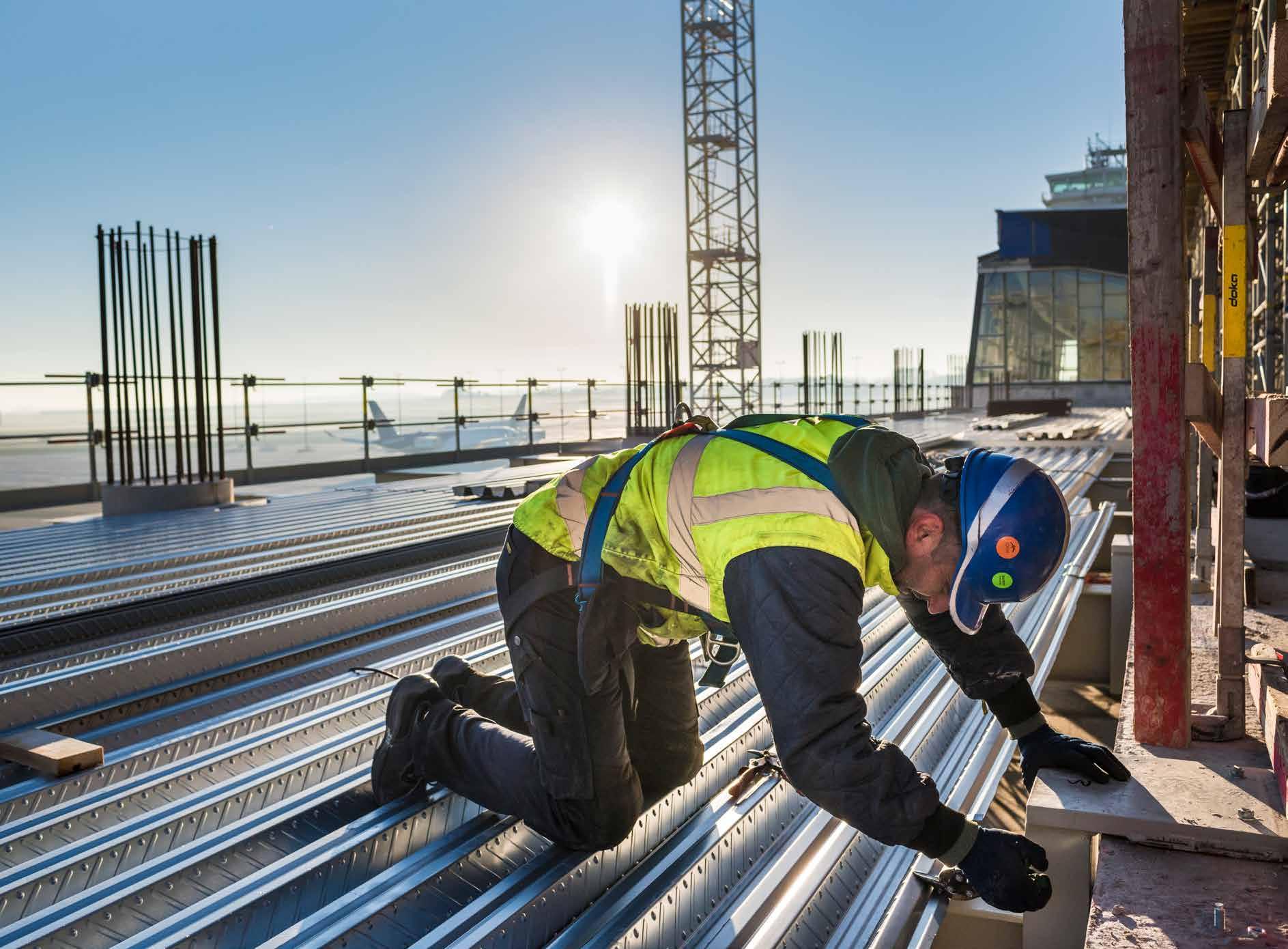
Brussels Airport is much more than an airport. With our bold vision and progressive approach, we stay one step ahead of the turbulent future. We invest in real estate, offer unique event venues and work closely with partners who share our core values.
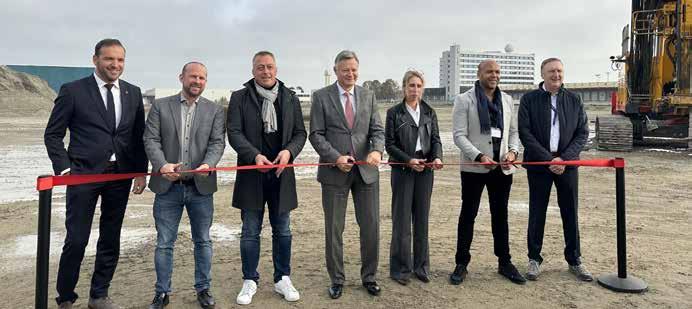
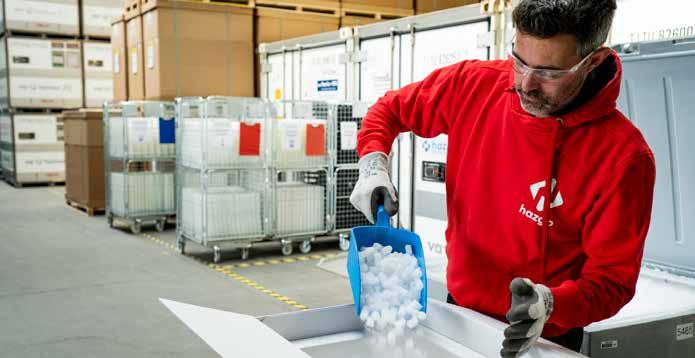
To stay ahead of turbulence, Brussels Airport Company is diversifying its activities by specialising and investing in real estate, among other things. We strive to provide a safe and inspiring working environment for our employees and offer companies the opportunity to set up business here, invest in the future, and strengthen the airport ecosystem.
Brussels Airport Company continues to focus on the modernisation and redevelopment of the cargo zone. By 2027, we will develop 25% more capacity, including 34,000 m2 of warehouses, accompanying offices, and a parking tower. In the central part of the cargo zone, we are demolishing old warehouses, while respecting the principles of the circular economy, and replacing them with new, fully sustainable buildings. All new buildings must achieve BREEAM Excellent certification, the global benchmark that considers energy efficiency, indoor air
quality, water management, material selection, level of innovation, mobility, and workplace well-being. “With these attractive buildings, we meet the demand of both major international players and smaller local businesses looking to expand their operations”, says Sarina Wolfs, Head of Logistics Real Estate “To strengthen our ecosystem, we aim for a healthy mix of customers who are active in our focus segments: pharmaceuticals, perishable goods, e-commerce, and live animals.” As of 2025, five solid partners with growth ambitions will occupy
these facilities: Nippon Express, Deny Cargo, Hazgo, EV Cargo, and DSV. Brussels Airport Company will provide each of them with a standard building while actively considering their specific needs and helping to address them.


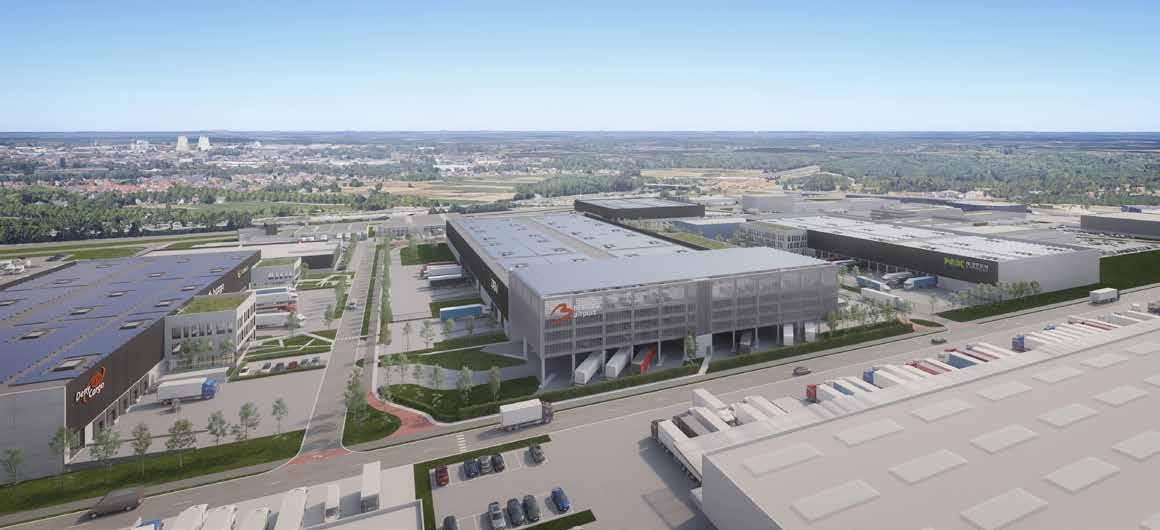
Quite a few companies in Brussels Airport’s cargo zone rely on the expertise of Hazgo to ensure the safe transportation of hazardous goods. These include flammable products such as paint and batteries, raw materials for the pharmaceutical industry and samples of infectious viruses. Hazgo, a well-established presence at the airport for fifteen years, inspects and packages goods in strictly controlled and regulated conditions. The company is known for its knowledge, flexibility, and efficiency. “Currently, we rent three separate buildings from Brussels Airport Company, which is far from ideal”, says Hazgo’s CEO Tom Heymans. “As we primarily provide services to other companies in the cargo zone, we wanted a solution to consolidate all our activities under one roof. It will enhance both our efficiency and the sense of community within our organisation.”
When Brussels Airport Company initiated the construction of a new multifunctional complex in November
2023, Hazgo didn’t hesitate.
“By centralizing all our services at this new site, Hazgo, as an innovative and fast-growing company, will be ready for the challenges of the future”, says Tom Heymans. The airport took into account Hazgo’s specific requirements and collaborated on the layout and design of the building. Tom Heymans adds: “In recent years, we have specialized in the pharma and life sciences segment, offering unique cooling packaging solutions. To continue serving this important growth market, we are exploring with Brussels Airport Company the possibility of making room for a special dry ice machine in the new building. This way, we can support the airport in maintaining its unique position within the global cargo community.”




Japanese company Nippon Express has been active at our airport for over forty years. Soon, their Belgian headquarters will have its new home in the central part of the cargo zone. As one of the world’s largest companies in the logistics sector, Nippon Express handles 1,400 tonnes of goods monthly at Brussels Airport. However, with 7,000 m2 of warehouse space and 1,500 m2 of offices spread across multiple buildings, the current facility can no longer keep up with the company’s long-term ambitions. “By moving into a new building of 10,000 m2, we can finally work comfortably and realise our growth plans”, says Michael Kamm, Managing Director at Nippon Express Belgium.
In the coming years, Nippon Express aims to further focus on the healthcare sector and position itself as the European gateway for the Japanese market. “Brussels Airport remains an attractive location, partly thanks to its cargo ecosystem”, adds Michael Kamm. Like all new buildings at Brussels Airport, Nippon Express’ new facility will be carbon-neutral and receive BREEAM Excellent certification. But it will also be a pleasant workplace, which is no minor detail. “Some colleagues have been working here since the beginning, and we want them to have the most enjoyable work environment possible. Moreover, the new building will help us attract new talent”, concludes Michael Kamm.
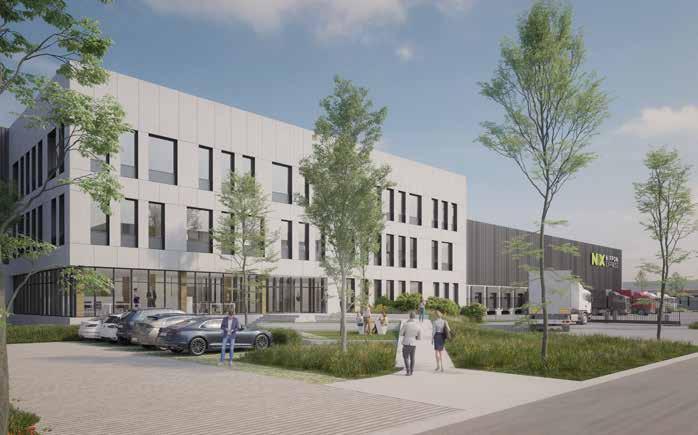
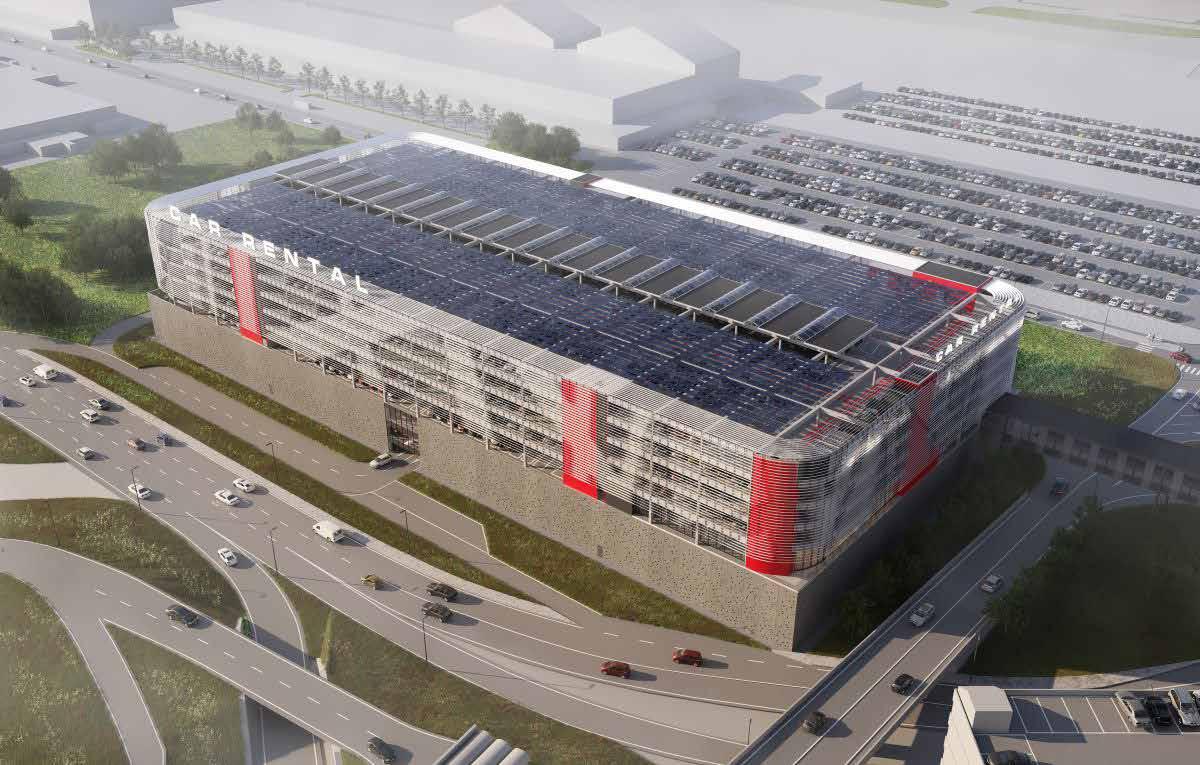


Brussels Airport Company is taking several measures to encourage modes of transport other than the car, and we are also actively focusing on the modal split. “But as our activities keep growing, so does the number of employees and passengers, which is why the airport needs additional parking capacity”, says Mira De Grande, Director Commercial Real Estate For this reason, Brussels Airport Company started constructing
a new parking building opposite the drop-off zone in October 2023. It will have eight floors, accounting for a total area of 90,000 m2. The new building will also house new offices for car rental services and will feature 650 charging points for electric cars.
For Aviato Academy, Brussels Airport
Company has been renovating building B54 since November 2023.
It will become home to a new, stateof-the-art training and experience centre: the Aviation Talent Hub (see page 33). “It will be a hybrid building with three halls and no less than twelve training rooms”, says Tom Van Steenbergen, Senior Project Manager Strategic Development.
“There will be standard classrooms and larger practice areas where new employees can, for example, train to become forklift truck drivers, as well as set-ups for digital teaching methods with state-of-the-art equipment.”
The renovation includes the development of office spaces, meeting rooms and an event space. Moreover, the new training centre will meet the highest energy efficiency standards by


implementing the latest technology, with solar panels on the roof and a green roof on the entrance canopy. The building is centrally located at the airport and easily accessible by public transport, with direct connections to and from Brussels Airport’s passenger terminal and cargo area. It is also easily accessible to cyclists. The renovation works are carried out in several stages, with completion scheduled for June 2024. The outdoor area, which, for the most part, will be turned into a soft landscape, will be completed in the last quarter of 2024. The Aviation Talent Hub with the new Experience Centre should be fully operational in early 2025.
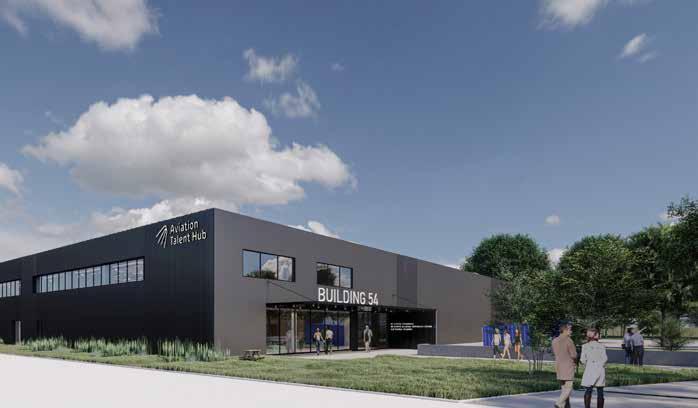
The architectural gem Skyhall and the stylish Sheraton Brussels Airport Hotel respond to the demand for quality event spaces in the heart of Europe. They are also an essential component of our broad diversification strategy.
Our Skyhall, built on the occasion of the World Expo 1958, is a leading venue for events and meetings. In 2023, it was the setting for 23 events organised by a wide range of companies and organisations. Hundreds of participants from the financial, tourism, automotive, sports and insurance sectors, among others, came here – with a breathtaking view of the tarmac – to communicate their message, thank their staff for their efforts and build relationships with various parties. Our employment partner Aviato (see page 33), which plays a crucial role in connecting talent with opportunities in multiple sectors, also held its annual job fair in the Skyhall. By all means, we were a vibrant hub of activity throughout the year.
The events in Skyhall also generated additional bookings at our Sheraton Brussels Airport Hotel, which contributes significantly to the revenues within our diversification strategy. Thanks to its central location, the hotel has the highest occupancy rate in the area. For example, the Sheraton has been the preferred accommodation for the artists performing at the Tomorrowland festival since its first edition.
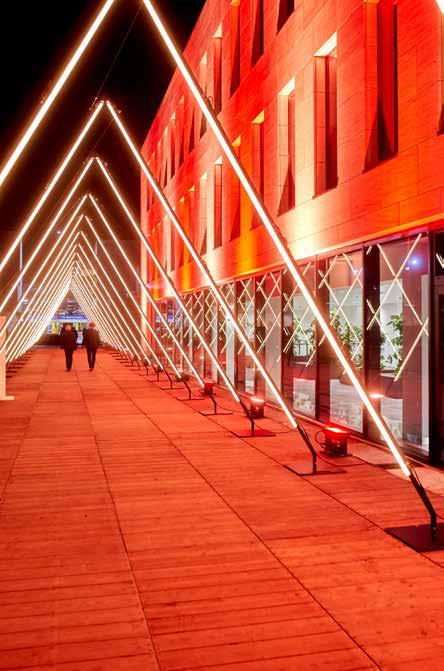
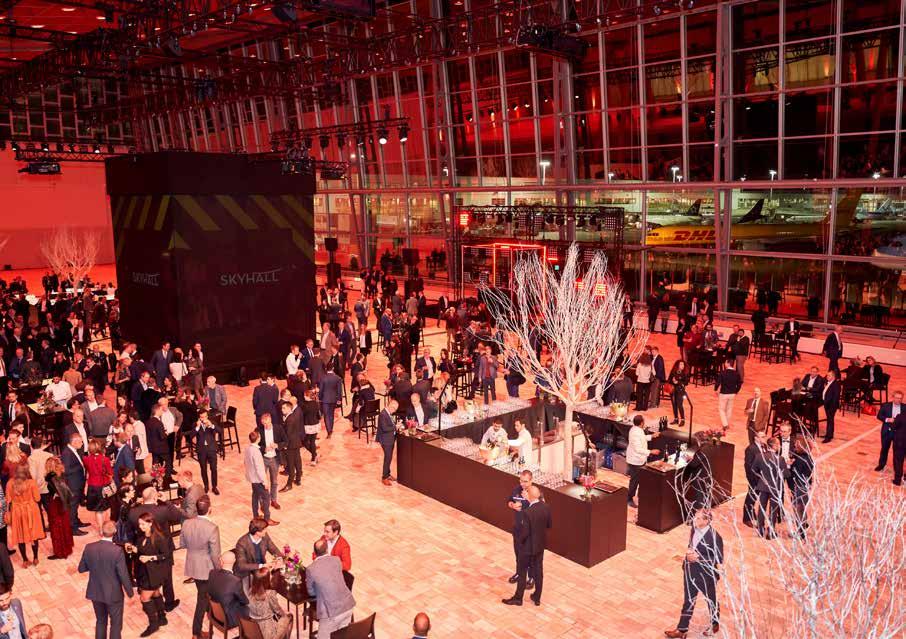

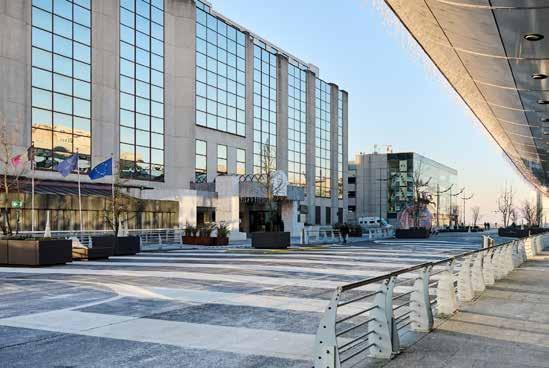
The Sheraton Brussels Airport hotel has nearly 1500 m2 of event space, with a range of large and small rooms for conferences, banquets and meetings. Many national and international companies and organisations choose our hotel as the venue for their annual events, and it is also the regular location for the Brussels Airport Aviation Awards. The 16th edition took place there in March 2023. With these awards, Brussels Airport Company aims to honour airlines and partners.
To further transform Brussels Airport into a diversified hub, we partner with pioneering companies and innovators who share our mission and values and who help bring our vision and goals to life.

Brussels Airport Company collaborates with companies that share our innovative and forward-looking DNA. Through our subsidiary Brussels Airport Ventures, we also invest in partners that help support our agility and growth. “We focus on three areas”, explains Strategy and M&A Lead Karen Dams. “First, we look for dynamic transport solutions that make our operations more efficient and streamlined so we can help our customers connect passengers and goods in an even better and smarter way. We are using smart technology, artificial intelligence, data analytics and drones for this purpose.” Since climate change alters how we work, live and travel, decarbonisation and circularity form the second focus area. “The energy transition is in full swing at the airport, and we are already implementing circularity thinking as much as possible, but we
continue to look for solutions to make all our projects around energy, waste management and real estate greener and planet friendlier.”

Finally, we want to continue developing the airport into a vibrant hub where business, culture, entertainment, events, and so much more can flourish. “We are home to more than three hundred companies, so we see ourselves as a small city bustling with energy around the clock. By forging new partnerships, we want to strengthen that community even more”, concludes Karen Dams.
airport as an incubator and testing ground for
At the end of 2023, Brussels Airport Company announced its participation in Flanders Technology & Innovation (FTI) a platform initiated by the Flemish government and seven other companies. Over the coming years, they will pool know-how, innovative ideas and data to develop concrete solutions to societal challenges.
As the airport is a small city where different sectors work together, Brussels Airport is an ideal incubator and testing ground and, therefore, a valuable asset to the FTI ecosystem.
The first FTI project we are participating in is EntertainmentLAB. Through this platform, Brussels Airport Company and Tomorrowland
want to support Belgian and international start-ups in circularity and recycling, among other things. These have been our focal points for years, and we have learned much about them.
In the autumn of 2023, we selected start-ups that want to make music festival visitors more aware of recycling or seek efficient methods to extract reusable raw materials from waste. With the help of the partners in EntertainmentLAB, they will be able to test their ideas and projects during Tomorrowland 2024.
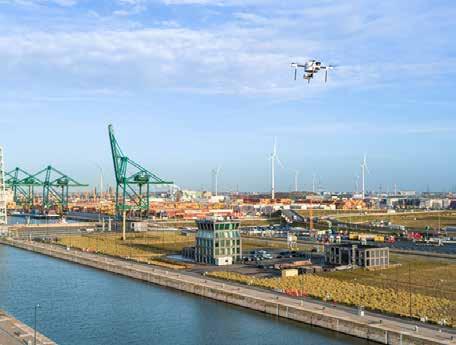

Investing in drone technology and implementing it
Brussels Airport Company is increasingly investing in developing innovative technologies, including drone projects that enhance airport security and operational efficiency. In March 2023, the airport announced a 30% stake in DronePort, a unique ecosystem focused on research, innovation and development in the drone and Advanced Air Mobility market.

Located on the former airbase of Sint-Truiden, this company wants to be a growth platform for other players who wish to develop this new market further. This partnership allows Brussels Airport Company to occupy a unique position in this emerging industry and to help build DronePort into a sustainable drone airport with international appeal.
DronePort will also be the place in 2024 where our partners from SkeyDrone will further develop the expertise they acquired from D-Hive drone-in-a-box, a project for the Port


of Antwerp-Bruges. “In the port, among other things, we did a risk analysis for a network of six unmanned drones,” explains Hendrik-Jan Van Der Gucht, Managing Director of SkeyDrone, “but we also made sure that all the permits were in order, and that all the technical parts were seamlessly connected and communicating.” As this type of distributed drone network could offer advantages for operations at Brussels Airport, SkeyDrone translated the port project’s legal and operational framework into an airport environment in 2023. “All the jigsaw pieces are ready, but we must run some tests before we roll this out at Brussels Airport. DronePort is by all means the ideal environment for that”, adds Hendrik-Jan Van Der Gucht. SkeyDrone is also taking steps to obtain its U-space certification, which will officially recognise it as an air traffic controller for autonomous drones, in Europe.
With its expertise in artificial intelligence and data analysis, the young, Brussels-based company Jetpack, in which Brussels Airport Company has a stake, is helping to optimise the passenger experience at the airport. Among other things, Jetpack worked on the forecasting model that maps passenger flows, allowing the airport to make data-driven decisions on potential capacity problems, where and when to deploy staff, which and how many goods to stock in the various shops, etcetera. “We are constantly working with Brussels Airport Company to spot new opportunities,” explains Pierre-François Crousse, COO of Jetpack, “but we are also looking at how we can deploy our know-how from projects for other customers at the airport.”


For Resa, the electricity grid operator in Liège, Jetpack designed an algorithm and a web application in 2023 that predicts how its customers’ electricity consumption will evolve in the coming years. “Because of the energy transition, Resa needs to scale up its network, but they especially wanted to know where to expect the biggest consumption peaks. By linking customer data to strategic scenarios in our simulator, they can see exactly where they need to adapt their infrastructure.” As Brussels Airport Company faces the same challenges in its ambition to become Net Zero Carbon (see p.27), the airport is also looking with Jetpack at how to implement this application here.
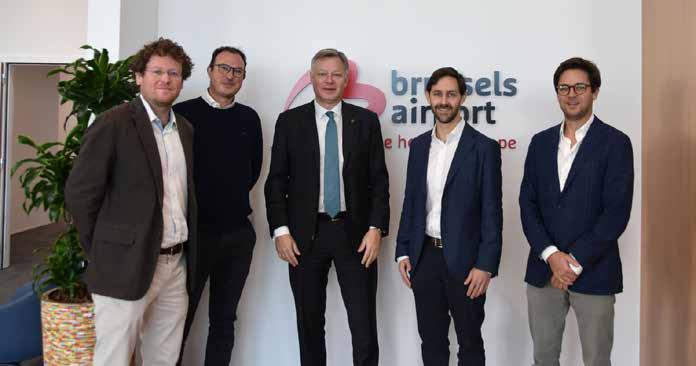
Through its subsidiary Airport Intelligence, Brussels Airport Company makes its data-driven operational knowledge, expertise and software available to companies worldwide. “We help all kinds of organisations that, like our airport, operate in a complex ecosystem with many partners”, explains Korijn Defever, General Manager of Airport Intelligence. “For example, we set up operational nerve centres from A to Z or optimise operations for both large and smaller players.” In 2023, the Airport Intelligence team advised several European airports ranging in size from 5 million passengers annually to even more than 30 million. “Our work often starts with one clearly defined question: ‘Can you take our existing operations centre to the next level?’ or ‘How can we make the most of our check-in capacity?’. We then go to our clients’ sites to observe their work and talk to everyone involved. Next, we make recommendations and prepare a concrete step-by-step plan they can start working with immediately. They often ask us to help them roll it out too and to take care of the follow-up.”
Airport Intelligence not only brings in permanent team members but often also experts working elsewhere at Brussels Airport. “Thus, our customers get first-hand knowledge from experts who are working on it day in, day out. But vice versa, our people
also learn from our clients’ approach, so new knowledge flows into Brussels Airport as well.”
Airport Intelligence is also constantly collaborating with Brussels Airport Company’s other subsidiaries. With Jetpack, the team works on the Airport Operations Plan software that it implements at other organisations; with SkeyDrone and DronePort, it looks at how airports can deploy drones. Airport Intelligence also joined forces with Aviato Academy: together,


they developed a training course for future APOC managers. “In this way, we can bring even more added value to our customers and develop new services”, concludes Korijn Defever.
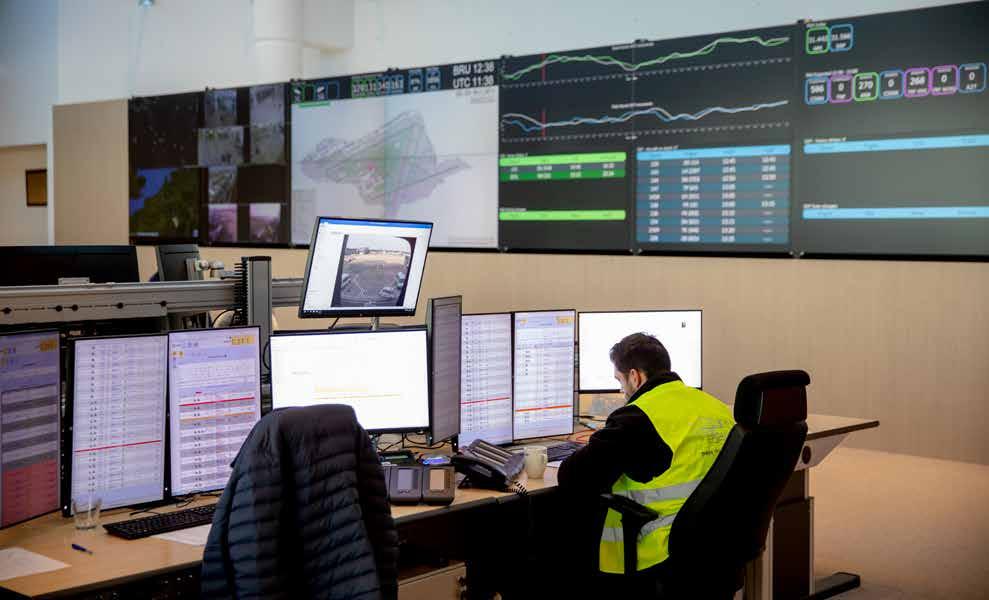
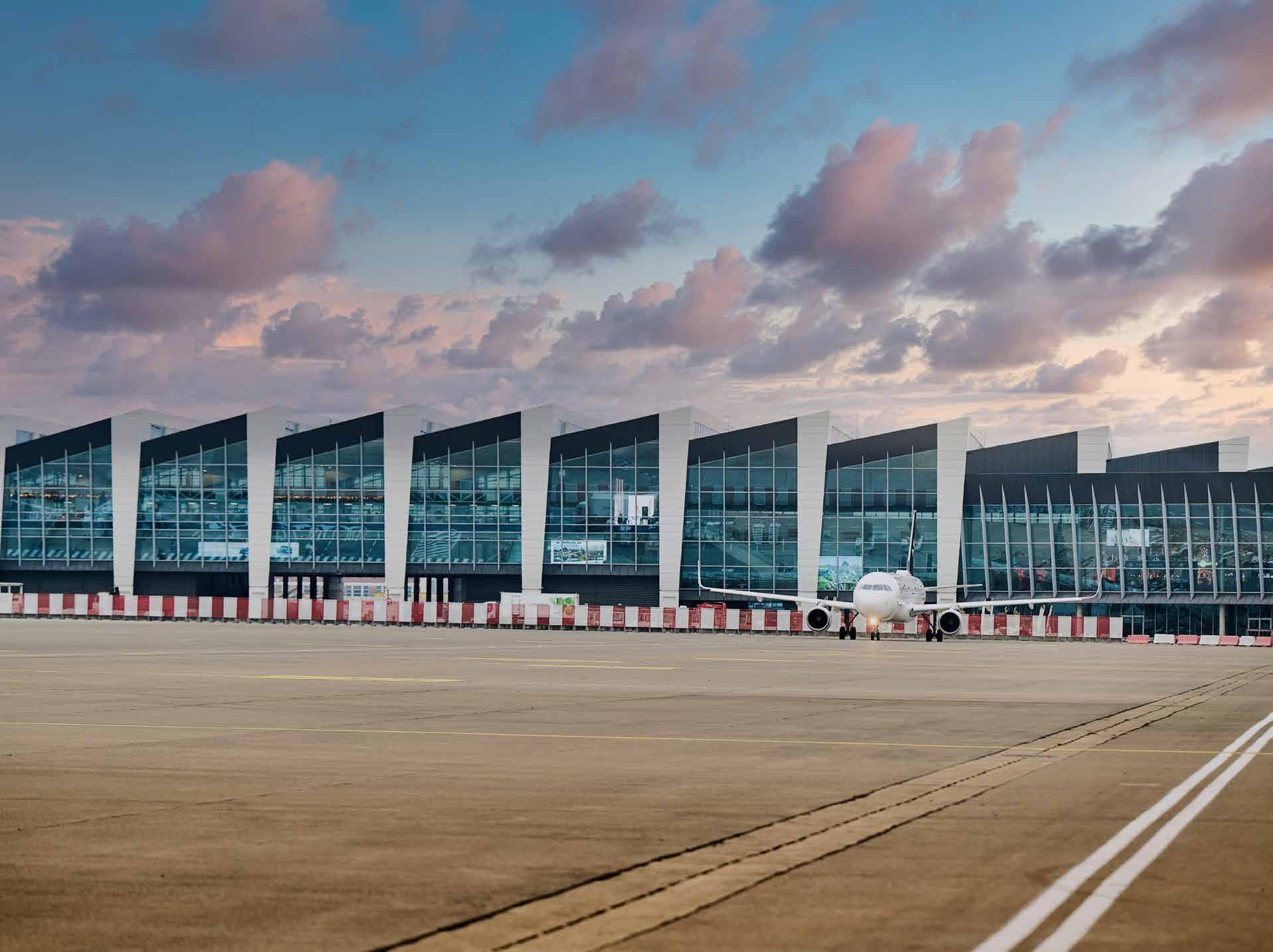
Sustainability is about so much more than our emissions alone. It is essential in everything we undertake regarding energy, mobility, and living environment. It also runs as a common thread through our recruitment policy and the inclusive career opportunities for our employees.
As an airport, our core mission is to connect people, businesses and communities. But to safeguard the well-being of those same people and the planet, we have made it a priority to integrate sustainability into all aspects of our work. It is the third pillar of our Shift 2027 strategy, and it helps us become more efficient and better prepared for the future.
For Brussels Airport Company, sustainable development is a strategic priority that steers the entire organisation and guides all major decisions. “It is the only way to guarantee the sustainability of all our activities and respect for people, the environment and the living environment”, explains Sylvie Van den Eynde, Chief HR & Corporate Affairs Officer “Brussels Airport Company constantly strives to strike a balance between two aspects. On the one hand, we are committed to strengthening the country’s connectivity, creating added economic value, and 64,000 direct and indirect jobs On the other hand, we want to do this sustainably thus protecting the surrounding area’s livability.”
In 2023, Brussels Airport Company further sharpened its sustainability ambition: the airport operator decided to eliminate CO2 emissions by 2030 and thus become “Net Zero Carbon” twenty years earlier than planned. Furthermore, in July 2023, the airport applied for its environmental permit to the Flemish government, seeking a renewal of the existing license for the operation of the airport within
the current grounds and infrastructure and under the current conditions. Brussels Airport did not request any infrastructure expansion such as runways or changed conditions such as additional night flights. Rather, it wants to grow in line with the economy and market demand in the coming years.
Independent experts also studied the effects of our operations as part of the licensing process in a so-called EIR or environmental impact report.
Sylvie Van den Eynde: “They mapped out the airport’s impact on the environment in terms of climate, noise, water, air and mobility, but also listed how we can improve the situation.
This EIR shows that Brussels Airport can indeed grow organically in terms of passengers and cargo and, at the same time, reduce its impact on the environment.” After all, the airport is taking measures to stimulate fleet renewal, reduce local noise levels by constructing additional noise barriers, and so on.
“We also put much effort into informing local residents and all stakeholders about the permit application.


To us, it is extremely important to always provide this level of transparency and information.” Thus, Brussels Airport Company set up a first information session in March 2023, and a second at the start of the public enquiry in December.
At the same time, Brussels Airport Company wants to play a pioneering role in the ecological transition and be a source of inspiration for the entire aviation sector. By cooperating more intensively with all partners at and around the airport, and internationally within the framework of the European Stargate project (see p. 37), we can make aviation more sustainable. Obviously, sustainability is a much broader concept than just the environment, as Sylvie Van den Eynde points out: “Economic and social aspects, as well as strengthening the competencies of our employees, are an integral part of the goals we want to achieve”.

Brussels Airport Company wants to be carbon-free by 2030, twenty years sooner than planned. These are the measures we took in 2023.
Since 2018, we have been a carbon-neutral airport, which means that we take all possible measures to maximally reduce our emissions and offset the remaining emissions. This approach aligns with the required ambition in the entire aviation sector. As the latter is responsible for 3 to 4% of all greenhouse gas emissions worldwide, it must substantially reduce its CO2 emissions. “Brussels Airport Company has raised the bar in 2023”, says Sustainability Manager Climate & Circular Economy Els Heyvaert
“We chose to become carbon-free even faster, by 2030 instead of 2050.”
To achieve this, Brussels Airport
Company is taking several measures. It only buys 100% green electricity and produces part of its energy with on-site solar panels. It has also laid the foundations for buying local green wind energy directly from a producer. Furthermore, the airport continues to develop its green mobility policy. Since 2022, only fully electric company cars have been available to staff. That’s why the airport is installing charging stations for everyone in the airport community who drives electric. Finally, Brussels Airport Company is preparing for the installation of a stateof-the-art fossil-free heating system using heat pumps. This will replace the
current heating installation of the airport terminal. The new installation will heat buildings with green electricity from 2027, reducing CO2 emissions by 70%. “These large-scale investments are fully in line with our climate ambitions. More than ever, we want to play a leading role in sustainable aviation in Europe”, Els Heyvaert concludes.
Brussels Airport Company is carbon-neutral today, which means we also compensate for the residual greenhouse gases (CO2-eq) we emit. We aim to achieve zero greenhouse gas emissions by 2030 (within scope 1 & 2); we will then be carbon-free.
Scope 1
The

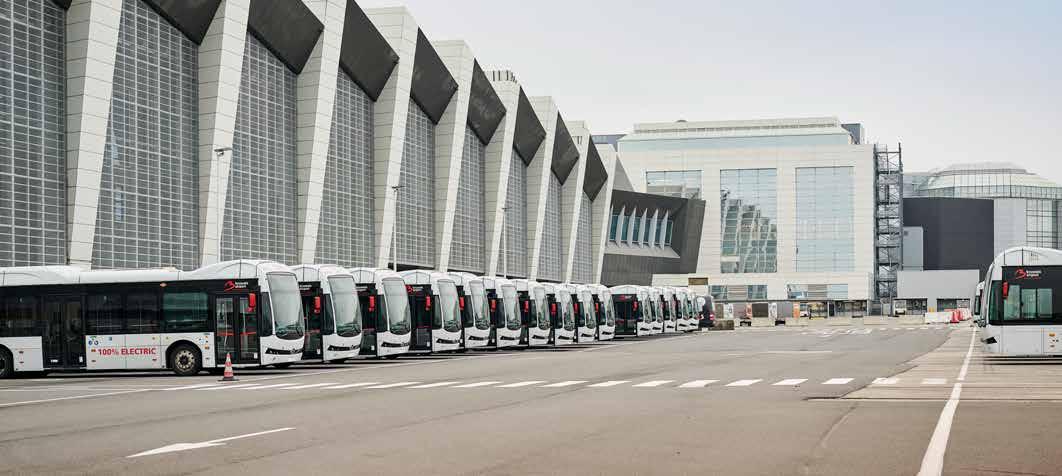

Scope 2
The
Since 2022, Brussels Airport Company employees can only order electric company cars. By 2026, the company car fleet will be fully electric. To adequately support this transition, in 2023, Brussels Airport Company started rolling out electric charging points for its staff and the airport community. By the end of the year, 150 charging points were available in the staff car parks, with another 42 charging points under construction. In time, we aim to provide a total of 1,400 charging points.


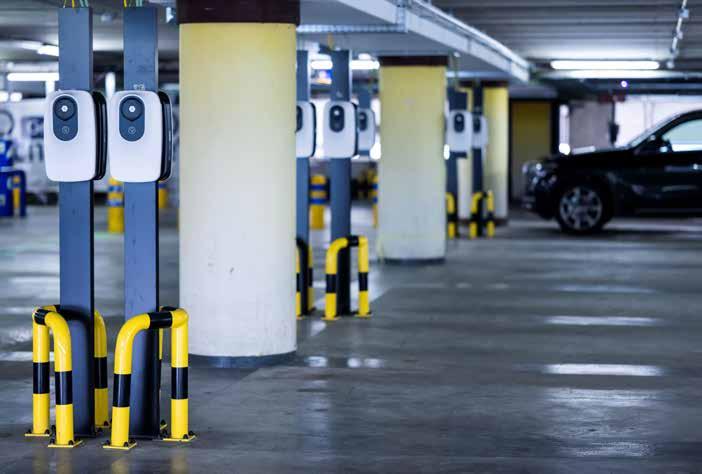
In 2023, Brussels Airport Company brought together a dedicated energy department that will further accelerate the measures to achieve Net Zero Carbon. “The energy sector is undergoing a complete transformation thanks to renewable energy sources and the electrification of the heating and mobility sectors”, says Energy Market Manager Frederik Van Cleemput. This shift is also well underway at Brussels Airport. The airport operator, Brussels Airport Company, has already made significant investments in researching and designing a new heating system, for which a tender is currently ongoing. The rollout of electric vehicle charging points (see left on page) will also help reduce our emissions. Fortunately, with its own private distribution network, Brussels Airport Company has a significant advantage in driving the energy transition. We are currently exploring how to combine the network with intelligent digital solutions to lay the foundation for a new energy power system. This would synchronize the local production capacity of our solar panels with the flexible energy demand,
including for our heat pumps and electric vehicles. To accelerate our ambitions and the smart synchronization between production and consumption, we brought together a dedicated energy department in 2023. They have initiated numerous projects that we plan to implement in early 2024. For example, the team contributed to the decision to invest in increased capacity of the electricity network, enabling further electrification of the airport and its partners. Furthermore, we aim to install more solar panels to expand our capacity of local green energy from 3 MWp to 10 MWp by May 2024 – ultimately aiming for 27 MWp by 2027. We have also successfully installed the first charging points so our employees can charge their electric vehicles on-site.
“These are just a few of the measures through which we will achieve our ambition to be carbon-free by 2030”, concludes Frederik Van Cleemput.


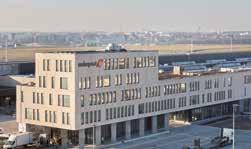
stands for Megawatt peak,
Brussels Airport Company strives for less waste, commits to more and better recycling and acts as much as possible from the circular mindset.
Brussels Airport Company aims for a minimum of residual waste at the airport by 2030. To achieve this ambition, we outlined the guidelines of a waste policy in 2023, with the motto ‘Less waste, more value’. This policy actually formalizes the already existing Waste Charter, a voluntary engagement between Brussels Airport Company and a large number of partners, including airlines, handlers and catering partners. “Our waste policy goes straight to the heart of the circular mindset”, says Caroline Bossuyt, Sustainability Expert Circular Economy. “For starters, we want to raise awareness as much as possible: among our employees, but also among partners and passengers. If you want to generate less waste, you first want to think about how to avoid it and reuse more materials. If that is not practicable, you must selectively collect the waste and recycle it to reuse it as material.” Brussels Airport Company will gradually implement the waste policy with all airport partners, following three specific approaches that depend on the degree of control it has over those same partners. For its own waste
streams, it will completely manage and control the collection and processing together with the waste collector (‘Control’), but also organise audits and training for employees and expand the sorting infrastructure. For partners in catering and retail, such as Autogrill and Lagardère, the airport will instead be a guide (‘Guide’) who coaches and facilitates. Other partners will be brought together in working groups, for example, to think about how they can take steps to reduce waste (‘Influence’). Caroline Bossuyt: “By getting together at set times to map out problems and opportunities, we can set up tangible actions to make our airport a real circular hub”.
Total waste production (in kg) in 2023 and the proportion of recycled waste (in %).
Since 2010, Brussels Airport has been collecting and purifying all of its wastewater in its own water treatment plant in the north zone. Sanitary wastewater from the airport building and the aircraft landing at Brussels Airport is processed immediately. Rain and meltwater that have been mixed with the products used to de-ice the aircraft on the tarmac in winter are collected via the sewerage system and stored until they are processed during the summer months.


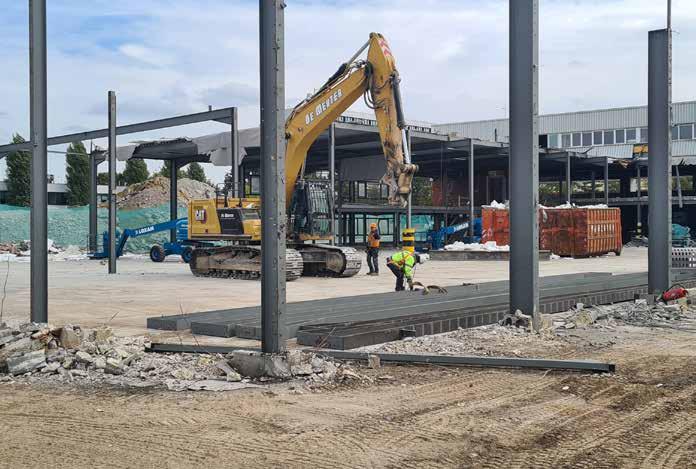
Demolition works in the cargo zone: 95% of the materials recycled


TARGET 2025

Total waste production (residual waste, PMD, paper and cardboard, organic waste, glass).

The proportion of recycled waste (PMD, paper and cardboard, organic waste, glass).
“Our water treatment plant can process 2,400 cubic meters per day,” says Nicolas Soenens, Compliance Expert Soil & Water, “roughly the equivalent of the daily consumption of 60,000 city inhabitants. This capacity is sufficient for the current number of employees, passengers and visitors, but we are constantly looking at optimising the process.” Furthermore, Brussels Airport Company started studies to determine how the purification efficiency can be increased or how to collect more propylene glycol – the chemical fluid that is used to de-ice aircraft. These projects will be carried out in the coming years depending on the results and technical feasibility. The further focus is on improving the installation’s purification efficiency.
In construction and demolition works, Brussels Airport Company always focuses on energy efficiency and sustainable techniques and materials. Where possible, the circular economy principles are applied, too. This was the case when, in 2023, eleven outdated buildings in the central cargo zone were being demolished, as Head of Build & Projects Gert Hoefnagels explains: “After several years of delay due to COVID and because of the complexity of large works – we always have to ensure that operations at the airport do not get compromised – we were finally able to start in the summer of 2022”. The airport operator sat down with construction company De Meuter to see how the latter could work as efficiently as possible, as well as what opportunities there were to reuse existing materials. “A circular approach is not
always obvious, let alone feasible, but in this case, we recycled at least 95% of all demolished materials”, says Filip De Meuter, CEO of Demolition and Groundworks De Meuter. Natural stone floors and walls, and carpet and ceiling tiles were given a second life elsewhere. Roofing and scrap were recycled, and a large part of the concrete was crushed and washed on-site for immediate reuse. “That is already beautiful, but also has an additional advantage: you don’t have to transport tens of thousands of cubic meters of concrete. That’s hundreds of trucks less on the Brussels Ring and, thus, less CO2 emissions”, Gert Hoefnagels adds.
Brussels Airport Company continuously takes initiatives to make life around the airport more pleasant, for instance by adjusting landing procedures and supporting local sustainability projects.
The airport impacts the residents and the living environment. On the one hand, it creates prosperity and wellbeing; on the other, its activities sometimes cause inconvenience. Therefore, we continuously work towards better-balancing air traffic and a high quality of life. We monitor air quality and noise pollution and introduce lower tariffs for quiet aircraft. Since 2016, we have been assessing the
impact of the airport and the effect of our measures with a survey in our neighbouring municipalities. Through a wide range of topics, we ask residents how pleased they are with their living environment. In 2023, 54% of the people living in the immediate vicinity of the airport were satisfied with their environment, one per cent more than the previous year.
Environment survey TARGET 2027
63% 54% of residents are satisfied with the liveability around the airport in 2023.
In May 2023, Brussels Airport Company and partner skeyes began preparations for operational tests to further reduce the noise impact of approaching aircraft. More specifically, the tests will be a demonstration of Increased Second Glide Slopes (ISGS) as part of the SESAR program (Single European Sky ATM Research). This initiative is, in turn, part of the European Highly Efficient Green Operations project (HERON), in which 26 partners will perform various tests in more than ten countries to limit the environmental impact of flight operations across all flight phases. “For Brussels, we opted to test the ISGS concept because it aligns with our strategy to improve the local living environment around the airport”, says Gert Geentjens, Sustainability Manager Noise & Air Quality.


During the test, participating airlines (Brussels Airlines, TUI fly, DHL, Vueling) will initiate landing at a steeper approach angle.
This allows them to approach the runway with less thrust, reducing noise impact. “According to preliminary research, ground noise could be reduced if pilots land at a descent angle of 3.2 to 3.5 degrees instead of the usual 3 degrees.” But of course, this assumption needs to be further tested in a fully operational environment, and that’s why Brussels Airport Company and skeyes prepared for two test phases in 2023, the first of which takes place in the autumn of 2024. “A change in the descent angle
by a few tenths of a degree may not seem like much, but there is a lot to it, especially because two landing procedures will be in use simultaneously”, says Alexander Vanwelsenaere, Sustainable Aviation Manager at skeyes “We are the first airport where the ISGS concept will be tested in a fully operational environment. Therefore, we have to make many arrangements with the various partners.” The HERON partners agreed on which runways were eligible for the tests and when they would take place, but they also carried out additional studies with support from EUROCONTROL and Airbus. Moreover, they provided extra guidelines for pilots so the new procedures could be flown as efficiently as possible. Brussels Airport Company defined fixed noise measurement points and adjusted the infrastructure where necessary. For example, a second PAPI system (Precision Approach Path Indicator) will be installed next to runway 25L; the lights serve as a visual aid for the pilots so they can descend at the correct approach angle.


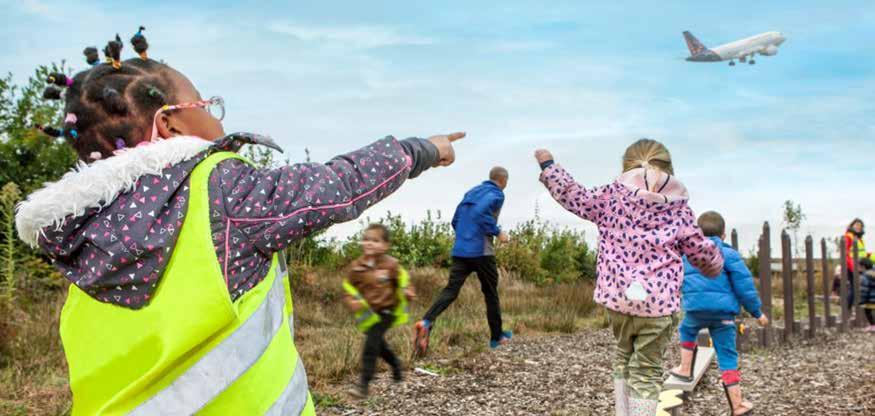


To strengthen the bond between residents, businesses, and communities in the region around the airport, we launched the Brussels Airport Fund in June 2023, in collaboration with the King Baudouin Foundation. “The airport has long supported good causes that make a positive difference and bring people together, but thanks to this fund, we can also boost smaller local actions and initiatives that benefit people and the environment”,
says Benjamin Werrebrouck, Public Affairs Manager. Of the 29 dossiers the fund received after the first call, an independent jury selected 18 projects focusing on nature, environment, energy, and mobility. For example, Borrekensveld in Grimbergen will become a green play area and meeting place for local residents; the Vlasselaar, a group residence for
adults with intellectual disabilities, will redesign its front garden to accommodate community-building activities. Community centre De Linde from Haren will bring about an inclusive photo project with an exposition thanks to the fund’s support. Furthermore, we support many cycling mobility projects, including a cargo bike solution to bring children from a Leuven trailer park to school, and a bicycle library in Sint-Pieters-Woluwe where children can borrow a bike.
All the organisations received financial support for their project at the beginning of 2024, for a total amount of €150,000. “We are very much looking forward to the results in the surrounding municipalities and the continued, positive impact on the lives of its residents”, concludes Benjamin Werrebrouck.
As an airport, we want to contribute to smoother mobility in and around Brussels. We are taking steps to transform into a multimodal transport hub where (electric) bicycles and various forms of public transport play an increasingly important role.
In recent years, Brussels Airport Company has been working on the Sustainable Airport Mobility Plan (SAMP), a large-scale multi-year plan aimed at sustainable and multimodal accessibility for passengers, commuters, visitors, and businesses. The airport has taken many concrete actions, like encouraging employees to carpool or take the train or bicycle. The new bicycle bridge over the Haachtsesteenweg, inaugurated in April 2023, is part of that plan: anyone wanting to cycle from the centre of Vilvoorde to the airport’s logistics zone can now do so safely and more comfortably.
To step up its ambitions and get more employees to commute by bike, Brussels Airport Company appointed a Bike manager for a two-year period in 2023. This was done in collaboration with the province of Flemish Brabant,
where Steven Fagard has been a staff mobility management member for many years: “My first task as the airport’s Bike manager was to get a clear view of the bicycle infrastructure so that we can better align our policy with it.” A data-collecting cyclist from the Fietserbond, an interest group for cyclists, objectively mapped all 15 kilometres of cycling paths with the necessary equipment, and through an extra survey, we investigated the users’ needs. “The measurement and survey results should result in a roadmap in 2024,” Fagard continues, “making cycling around Brussels Airport noticeably more pleasant in the coming years.”
Targeted campaigns brought the bicycle to the attention of the airport community. For instance, 61 employees from various companies in the cargo zone participated

in The Bike Test in September, testing electric bicycles, speed pedelecs, and cargo bikes for their commute. During mobility week, Brussels Airport Company distributed bicycle bags and raffled off an electric bicycle among the airport employees. Finally, through the Stargate project (see p. 37), the province of Flemish Brabant installed three counters that measure bicycle traffic near the airport, providing extra data with which Brussels Airport Company can further fine-tune its cycling policy.

31% other means of transportation
69% cars, taxis and rental cars

40% other means of transportation TARGET 2027
This is how our passengers and employees came to Brussels Airport in 2023:
60% cars, taxis and rental cars
Carpool tool connects the airport community and makes it more sustainable
With the carpool tool, launched during Mobility Week in September 2023, all 24,000 employees of the airport community can easily arrange to drive to and from work together. This digital platform is an initiative of Brussels Airport Company and Air Cargo Belgium and was realised with financial support from the Stargate project within the EU Green Deal. The tool helps to achieve the ambitions in terms of the modal split: it is, therefore, entirely in line with Shift 2027’s sustainability pillar. The more colleagues arrange to carpool via the platform, the less car traffic and therefore fewer traffic jams there will be. As an extra incentive, Brussels Airport Company also provides reserved parking spaces for these carpoolers. After four months, almost 200 airport employees created a profile, and half of them say they regularly drive to work together. The carpool tool not only provides a more sustainable mobility connection, but it also connects the community itself.
We can only achieve Shift 2027’s ambitions if all our employees support them. Therefore, we continue to build a pleasant and inspiring place where they feel at home and can grow.
Brussels Airport Company wants to be a place where everyone feels welcome and gets equal opportunities. Thus, we invited all employees for a roundtable discussion about diversity, equality, and inclusion (DEI) and developed the Diversity & Inclusion manifesto with four commitments:
• We create a vision, linked to our five core values, that is shared by our employees
• We aim for an accessible environment with no room for discrimination
• We help our employees in their personal development through trainings and workshops
• We support our employees in providing an inclusive customer experience
For a company like ours, innovation is essential. This is why we are constantly looking for new people with new ideas. However, we must also differentiate ourselves as an employer to attract and retain top talent. In 2023, we launched a website that supports our existing employer brand campaign, showing job seekers that those
who join us will find themselves in an inspiring environment – a place where challenges are turned into opportunities, innovation is the keyword, and every individual can make a difference. With the tagline ‘Be part of our beating heart’, we ask potential candidates to stop dreaming about what tomorrow’s airport might look like. We want them to seize the opportunity and realise their wildest dreams and ideas regarding hub performance, sustainability, and diversification in our teams of experts.
Our employee engagement survey shows that Brussels Airport Company’s vision and mission are clear and supported by our employees. Therefore, we keep focusing on strategy boosters, where we indicate how we achieve them year after year and show what plans we have for the future. In 2023, we ensured that our 5Cs (the five core values: Care, Collaboration, Courage, Customer centricity, and Commitment) could permeate deeper into the DNA of our employees. For this purpose, we
launched initiatives like Values in the Spotlight, organising internal workshops, presentations, and activities around one specific value.
Giving our employees the chance to give their best and build sustainable relationships
Through a survey, we mapped our employees’ engagement, commitment, and energy level: Brussels Airport Company scores 74% on the WTW Sustainable Engagement Index but aims for 80% by 2027. Therefore, we will expand existing projects and set up new ones, such as our 5+1 core competencies model. This defines the five skills everyone working at Brussels Airport Company must master, with one extra skill for people managers. It clarifies what is expected in their jobs, fully aligns with our values and strategy, and is therefore also measured in our performance process. It also helps to choose the right development path that, on the one hand, will support our employees’ growth and, on the other, allow the organisation to realise its strategy.
Sonja Gehlen: “One giant machine in which every cog is indispensable”
When Sonja Gehlen, Head of Aerodrome Operations, started at Brussels Airport Company as a Financial Controller fifteen years ago, she was happy to get close to the aircraft: aviation had intrigued her since early childhood. Since then, she has been working behind the scenes to ensure the smooth operation and success of the airport in various positions.
“All my jobs were behind the scenes in a way – people often have no idea they exist, but in large organisations such as ours, they are no less than indispensable”, Sonja says. As a Central Services Manager, she managed a team and coordinated budgets for various projects, from maintenance contracts to major investments and public tenders. Five years later, she became Senior Aviation Development Manager, negotiating with airlines to add Brussels Airport to their network. “The team conducts market studies and explores data to build a strong case, which it then uses to approach airlines. Sometimes it goes quickly, but often it takes several years before an airline commits.” So, the fact that passengers can fly directly from Brussels to Toronto is partly to Sonja’s credit. And even though
she now holds another position at the airport, any success of her former team still gives her joy. “When Singapore Airlines announced it would fly to Brussels again, I really celebrated along.”
Today, Sonja and her teams ensure that the hundreds of aircraft at Brussels Airport can take off and land in optimal and safe conditions. The Bird & Wildlife Control Unit keeps the tarmac free of birds and wild animals, Airside Support is responsible for mowing the grass or escorting vehicles on the tarmac, and the Airside Inspection team inspects the runways five times a day to prevent incidents. All teams are supported by a range of experts in these matters. The Winter Operations Team keeps the area free of snow and ice in winter. As a service and people manager, Sonja makes sure her teams have the necessary resources and procedures to guarantee safe operations 24/7:
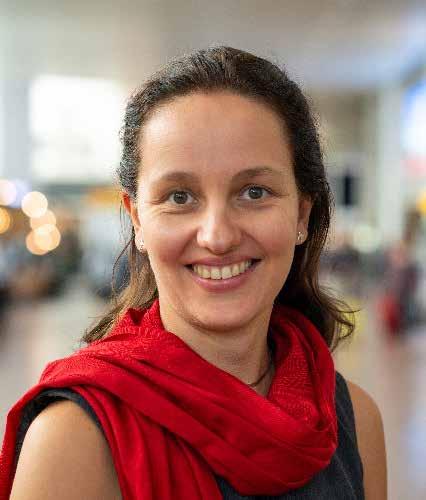
“My mission is to make them work more efficiently to support the airport’s growth, but it is equally important that my teams take pride in what they do. The airport is one giant machine where everyone does their share, and these jobs are truly indispensable. Without them, the airport would come to a standstill.” How does Sonja see her career progressing? “I never drew out my career path in advance, and I equally enjoyed every job I did. I will sense when it is time for a new challenge, but it’s certainly not yet the case.”
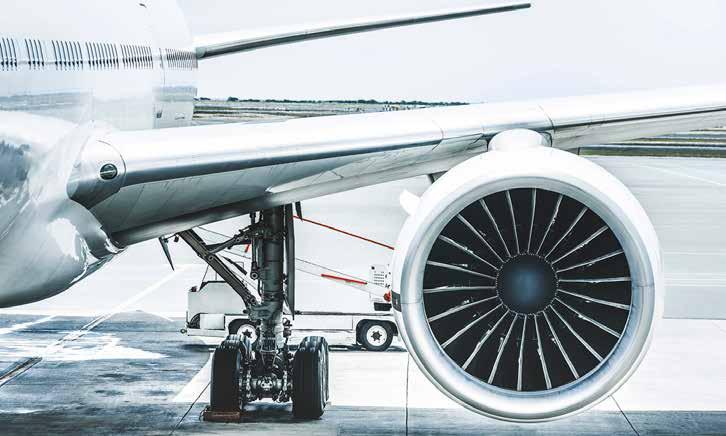
Brussels Airport is an ecosystem of several thousands of jobs, some more technical than others. By targeted recruiting and creating a framework in which talent can continue to grow, our employment centre Aviato and training centre Aviato Academy contribute to the airport’s success.
For Aviato Academy, which carries ‘lifelong learning’ as its motto and offers training to all airport workers at Brussels Airport and throughout Belgium, 2023 was primarily the year in which it strengthened its foundations. The European Regional Development Fund approved the grant application for developing a digital training and experience centre: the Aviation Talent Hub should become the place where aviation talent can be trained and retrained. “The centre, which we are developing in collaboration with our partner Ocular, will feature interactive tables on which students can learn, for example, how to park planes as efficiently
as possible on the tarmac”, says Isabelle Borli, General Manager of Aviato Academy “In the past, we explained this with a PowerPoint presentation and did a simulation with miniature aeroplanes, after which the student had to further perfect their skills on the job. By contrast, the interactive simulation in the new digital training centre has a dynamic that closely mirrors reality.” The accompanying Experience Center will have a multifunctional lab space where job seekers can assess their skills and get advice on the training they need to follow. There is also room for an Airport of the Future game with which Aviato Academy wants to entice
STEM pupils to work at Brussels Airport, and a studio from which courses and events can be streamed to the rest of the world. “In the Aviation Talent Hub, learning, growing, and innovating will go hand in hand. It confirms our dedication to creating the future airport”, concludes Isabelle Borli.
182 AIRPORT PARTNERS are Aviato Academy members
1,131 trainees attended a classroom course
2,642 TRAINEES without airport badges attended an e-learning
Aviato: deep knowledge for better job matching
For recruiting new employees, Brussels Airport’s community can rely on the expertise of employment centre Aviato. This non-profit organisation tries to make working at the airport more accessible to everyone through, for instance, information sessions for different target groups. However, Aviato also helps companies fill vacancies. “Companies primarily seek as perfect a match as possible with job seekers,” says Isabelle Borli, General Manager of Aviato and Aviato Academy, “so it is important that we as a team have a crystal-clear picture of the company, their activities, the company culture and the job content itself.” That’s why Aviato launched the ‘All Eyes on Brussels
Airport’ project in 2023. The team spends half a day observing the different functions of one of the many airport companies. With the insights it gains from this, it can screen and inform candidates even better in the future and thus propose stronger candidates. “If you have seen for yourself what employees at, for example, DHL, Safran or Lagardère do, you have a much better idea of what their job entails.” Thanks to Aviato, in 2023, as many as 819 new employees could start at the airport.
421




819 JOB PLACEMENTS
40 ORGANISATIONS supported by Aviato for recruitment
Safety is a top priority at Brussels Airport. It’s why we continuously invest in safe infrastructure and security, and work hard to create a safety culture that involves all our employees. By working closely with partners such as the aviation police and holding a biennial full-scale emergency exercise, we try to minimise the risks at the airport.
Brussels Airport Company strives for ever higher safety for everyone: passengers, employees, subcontractors, passersby, and visitors. High-level safety systems, set up according to the guidelines of ICAO and EASA, ensure that our daily operations and the work on the many construction sites can proceed as safely and responsibly as possible. The cooperation between our security services, the police, customs, and our Fire & Emergency Services (FES) also contributes to this. Various employees of Brussels Airport Company provide daily advice and carry out risk analyses of existing and changing airport operations. Furthermore, our Health
& Safety department takes numerous measures to make the airport a safe and healthy place. It ensures that all processes are in line with the latest government guidelines. They also emphasise the importance of wellbeing at work, where the mental aspect is becoming increasingly important. This approach works, as shown by the regular audits that Brussels Airport Company undergoes. It helped us achieve our ISO45001 accreditation again in 2023, an international standard for the safety and health of the working environment.
To secure the airport and its surroundings at all times, the Brussels Airport security services work closely with the aviation police. The latter carries out checks and detects false and forged identity documents. In addition, they also carry out daily police tasks in and around the airport: urgent interventions, patrols, and campaigns. In 2023, there was continuous consultation between the aviation police and Brussels Airport Company about implementing the Entry-Exit System,
a digital system with which Europe wants to make its territory safer in the near future. “When travellers from non-EU countries cross a European border for a short stay, they will have to register. Their identity, travel documents and biometric data, such as their fingerprints, will be stored in the system. This will provide more security”, says Simon De Block, director of the aviation police.

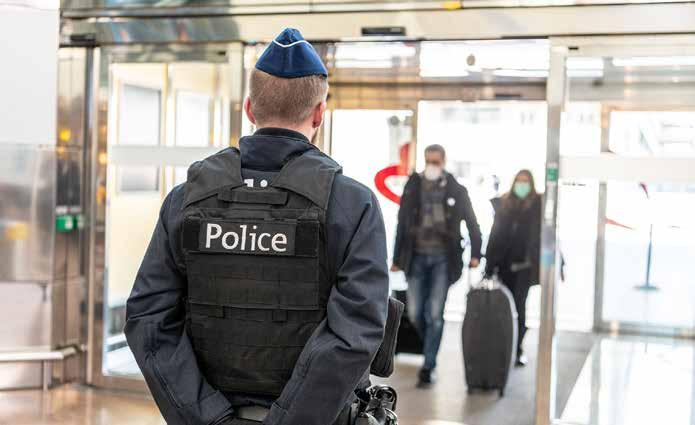

In November 2023, the Governor of Flemish Brabant led a full-scale emergency exercise at Brussels Airport. The exercise is organised biennially to practice internal and external emergency and safety procedures in as realistic a setting as possible, and to test the functioning of the special emergency and intervention plan (BNIP).
It is tied to the airport’s EASA certification, which every international European airport must comply with.
All external intervention services participated: the fire brigades, the medical intervention services, the Federal Police, Defense, the relevant local authorities, and the federal emergency planning service of the governor of Flemish Brabant. Together,
they simulated a collision between a military helicopter and a taxiing aircraft.
The test scenario was drawn up in consultation with the federal emergency planning service of Flemish Brabant, all intervention services, and the involved external partners. To carry it out as realistically as possible, most actions were simulated live, using, among other things, a training aircraft and a helicopter wreck. No less than 450 people participated in the disaster exercise, which lasted six hours. It was followed by a debriefing, during which all participating parties evaluated their working methods. Through their experiences with this practical test, they were able to refine their procedures.
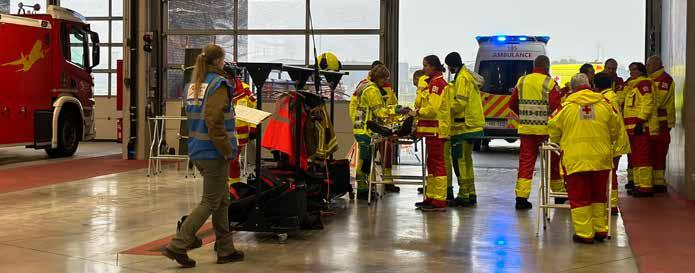
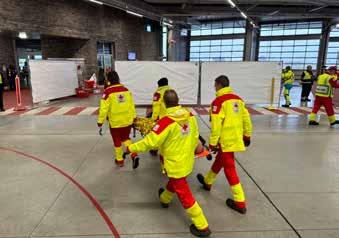
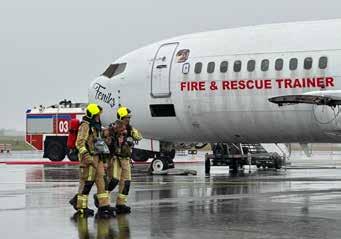
A specialised team collaborates daily with our various departments and partners to achieve the numerous ambitions and projects of Brussels Airport Company’s sustainability strategy.
The Sustainable Development team supports the other departments of Brussels Airport Company in integrating sustainability into their daily tasks. Some members specialise in the legislative framework surrounding environmental aspects, while others focus on achieving our strategic objectives. The team’s structure is based on Brussels Airport Company’s sustainability strategy and includes various core domains.
The department is led by our Head of Sustainable Development, who is supported by managers in different areas, who in turn are assisted by a team of experts. Each team member works directly with the other departments
to ensure sustainable development, which is a common thread throughout all Brussels Airport Company’s actions and projects. Additionally, the Asset Management team closely examines all aspects of managing our real estate assets from a sustainable perspective in the medium and long term. The sustainable development team, of course, enjoys the support of the management committee, which is fully involved in the initiatives and projects that are part of our strategy.
The sustainable development vision and strategy that we apply at Brussels Airport Company today are based on a series of workshops we held in 2018 with representatives from various departments. CIFAL Flanders, part of the UN Institute for Training and Research, assisted us in organising and elaborating these workshops. We started from two perspectives –inside-out and outside-in – and continued to build on this work in 2023.
Based on the inside-out perspective, which looks at the environmental, social, and governance impact of our organisation and activities, we selected priority sustainability topics related to Brussels Airport Company’s core activities. We considered different themes defined in the ISO 26000 Corporate Social Responsibility (CSR) standard. From the outside-in perspective, we examined how our organisation can
contribute to societal challenges. To this end, we started with the United Nations’ SDGs, or Sustainable Development Goals, a blueprint for a better and more sustainable future for everyone. We identified five areas where we can have a positive impact: people, prosperity, planet, peace, and partnerships. In these areas, we have set ambitious goals and taken action to improve our performance and create value for our stakeholders.
The following SDGs are particularly relevant to Brussels Airport Company:
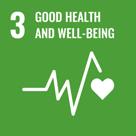

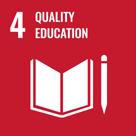


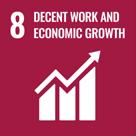
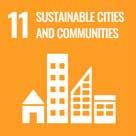

Evolving towards a better living environment in and around the airport regarding air and noise quality and anchoring diversity and inclusion within the company. We offer all employees opportunities to continuously learn in order to stimulate sustainable careers.
We believe aligning our mission with the SDGs can enhance our competitiveness, resilience, and reputation as a leading European airport.
Investing in a sustainable future for the airport and society.
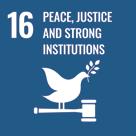
Paving the way towards a carbon-free airport and helping to limit greenhouse gas emissions in scope 3.
Implementing sustainability reporting in the organisation and strengthening good governance policies.
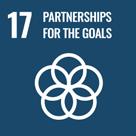
Through partnerships, we aim to achieve our ambitions more quickly.
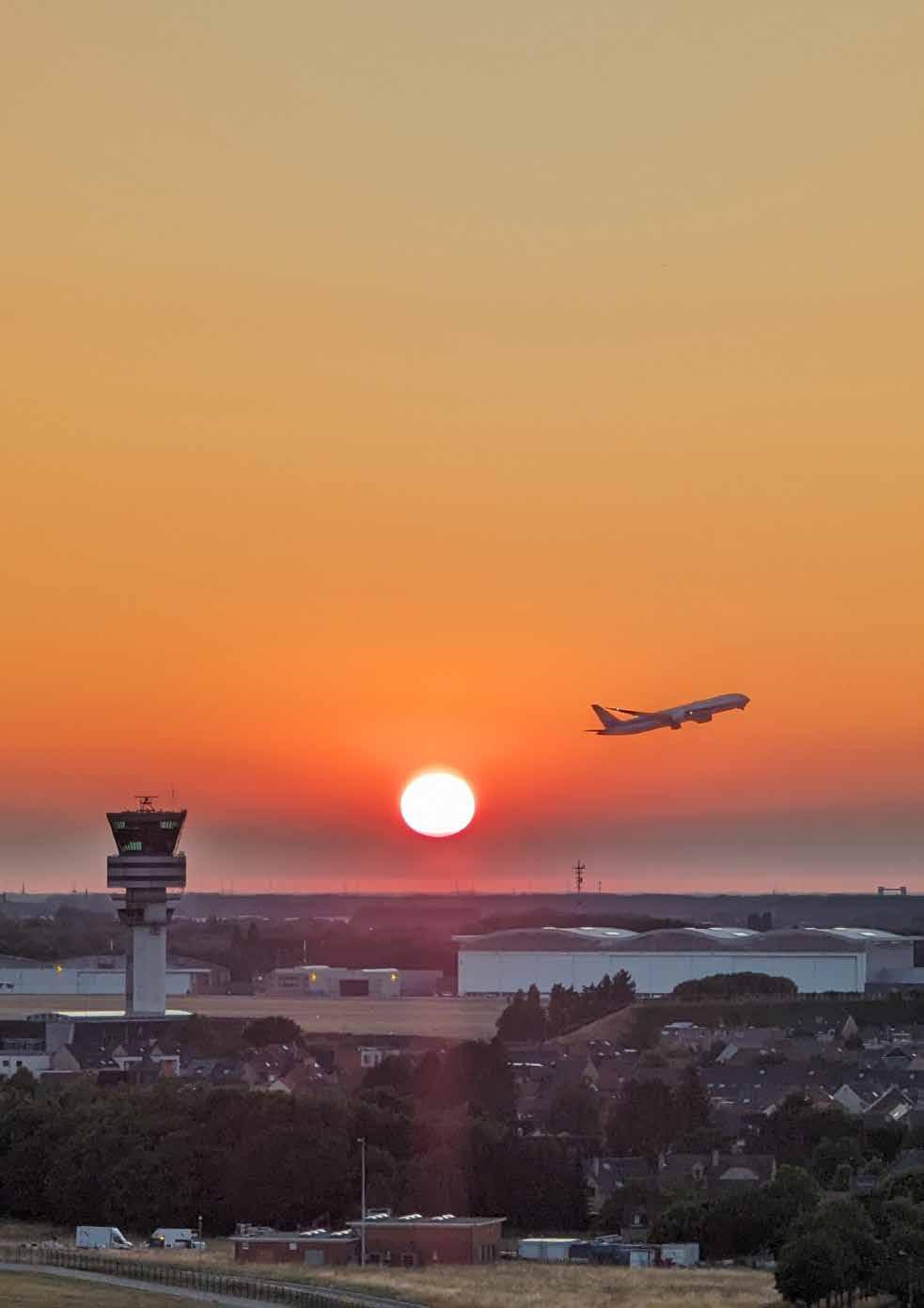
We cannot make aviation more sustainable alone. By working with our partners, we combine our knowledge and expertise and achieve much more.
As an airport, we find it necessary to involve our stakeholders in what we do. Our activities significantly contribute to the economy and employment in Belgium, but they also impact our residents’ environment and well-being. Together with them, we want to explore what we can do to limit this impact as much as possible. Therefore, Brussels Airport Company organises a consultation committee every quarter, chaired by the deputy of the province of Flemish Brabant, for which we invite representatives of the surrounding municipalities and our partner skeyes. During these meetings, we inform our stakeholders about the environmental aspects of the airport, listen to their concerns, and together seek solutions for challenges such as noise pollution or other forms of impact.
CIFAL Flanders, the Unitar-recognised training centre for the Sustainable Development Goals (SDGs) in the Benelux, has launched an SDG Learning Network with several partner organisations, including Brussels Airport Company. Through this channel, we exchange information, knowledge, and expertise about sustainable transitions with the other parties. In addition, we are also on the board of CIFAL Flanders, and they support us in developing and implementing the SDGs. Our sustainable action plans were already rewarded with a Unitar ‘SDG Pioneer’ certificate in 2019, and in 2023, we became an ‘SDG Champion’. We are currently following the next three-year ‘SDG Ambassador’ programme, which we hope to complete again with a certificate.
Our memberships
We are currently members of the following umbrella federations and interest groups:
• ACI Europe
• Agoria
• AmCham
• Antwerp Management School
• BECI
• Belgo-Indian Chamber of Commerce & Industry
• CIFAL
• Employers’ Federation for International Trade
• European Chamber of Commerce
• Febeliec
• Flemish-Chinese Chamber of Commerce
• Grondwijzer
• IATA
• ICAO
• The Belgian-American Chamber of Commerce in the US
• The Shift
• VBO
• Vlario
• VLEVA
• Voka

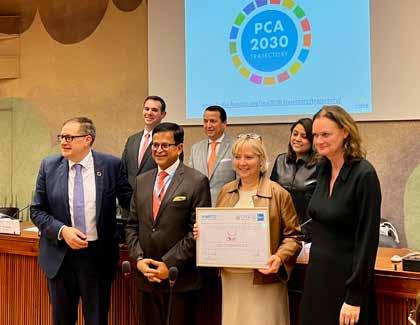
With the European Stargate project launched in 2021, we can achieve our sustainability ambitions faster and, at the same time, inspire others.
Stargate aims to actively make the aviation sector more sustainable. It was made possible thanks to European financial support as part of the European Green Deal, a package of policy initiatives to help the EU with the green transition. Initiator Brussels Airport Company leads the Stargate project but works closely with 21 partners: transport companies, universities, research institutions, consultancies, and local governments. Brussels Airport Company also continuously collaborates with Budapest, Toulouse, and Athens airports.
Over five years, about thirty Stargate projects, large and small, are running, from research and test cases to effective implementations of more sustainable solutions. They cover three areas of content: decarbonisation, better living environment, and sustainable mobility. The knowledge and results are shared with the entire sector so that other airports can implement them.
In 2023, the project team took many preparatory steps for tests that will be carried out in 2024, intending to shift Stargate into a higher gear.


“We are proud that, for the past two years, we have worked closely with our partners Brussels Airport, Toulouse Blagnac Airport, and Athens International Airport within the Stargate consortium. As topics and initiatives around sustainability in aviation expand, it is vital to keep the proper focus. Which new technology do you pursue? Which specific operational improvement do you test instead of another? Sharing information is key, as the analysis from your perspective can be helpful to your partners and even the whole aviation sector. For instance, Brussels Airport’s Digital Twin, Digital Green Lane and SAF initiatives have been a major source of inspiration. We created a database for our own Digital Twin and set up Digital Green Lanes that optimise cargo flows and reduce emissions. In 2023, we also coordinated a successful SAF test with airport partners and worked on the first fully electric handling of a flight – each one a milestone on the way to our CO2 emission reduction. By consistently following this strategic path, we aim to achieve carbon neutrality by 2035 at the latest.”

— SAROLTA KATONA Head of Sustainability, Budapest Airport


“No airport can undertake its sustainability journey alone.
Access to funding is critical, but access to expertise within the value chain is equally important. Athens International Airport has brought its solid expertise in solar energy to the Stargate table. In 2011, we commissioned the largest unified Photovoltaic Park (PVP) on an airport site. After more than a decade of successful operation and the associated environmental benefits, we are currently expanding the PVP. Our ultimate goal is to produce all the electricity we need onsite, thus becoming fully autonomous from the national grid within the Stargate project’s timeframe. Although we cannot expect the sustainability problem to be solved within the 5-year term of Stargate, we expect significant progress on several critical environmental challenges with the help of digitalisation. That’s why, in 2023, we have set up a proof of concept for the electrification of specialised operational vehicles and a pilot project for air cargo operations. We also took steps to influence the mobility patterns of our employees.
The dream outcome is that all four airports in the Stargate programme will be a source of inspiration for airports of all shapes and sizes in the European network and beyond.”
— CHARLES MICHAEL O’CONNOR Manager Environmental Services, Athens International Airport
“Like our fellow airports in Stargate, we have spent the first two years setting up a range of projects that pursue the programme’s three main goals: enhancing further decarbonisation, improving the local environmental quality, and stimulating the modal shift.
In the summer of 2023, we opened an ultra-fast EV charging station designed in collaboration with Electra. Situated at the airport entrance, it’s a place where all electric vehicle drivers can recharge their batteries in minutes instead of hours – it is available not only to passengers and airport staff but also to anyone working or living in the area.
To enhance the modal shift and nudge our passengers and colleagues toward more sustainable ways of transport, we are working on an app that shows carbon emissions for each transport mode. Simultaneously, we made the airport more bike-friendly for our employees –receiving a gold medal from the Objectif Employeur Pro-Vélo for our efforts. Finally, we started exploring the idea of a 100% energy-autonomous airport and installed a task force to enhance the creation of a SAF ecosystem at the airport.”
— ANNE JULIA Responsable
Développement
Durable, Toulouse Blagnac Airport


SAF, or Sustainable Aviation Fuel, is the collective name for various sustainable aviation fuels. It is an important tool in making aviation more sustainable and reducing carbon emissions from air traffic. The European Commission (ReFuelEU) is working on a requirement of 2% SAF by 2025 and 6% by 2030 and onwards.
As part of the Stargate initiative, Brussels Airport Company is exploring ways to further promote the use of SAF. In 2023, the airport and its partners To70 and the University of Hasselt took a close look at the SAF production chain.


According to Vincent de Haes, Sustainable Aviation Consultant at To70 this was a more than necessary step:
“There are quite a few steps between creating SAF and a plane effectively refuelling. Many different players are involved: companies that collect and process oils for biofuel, energy companies that produce and mix SAF, airports that make them available, airlines that purchase SAF and companies specialised in storage and refuelling. Together with UHasselt, we mapped out this production chain in detail. This allowed us to advise Brussels Airport Company on how it can contribute to
setting up a viable SAF chain.”


Professor of Environmental Economics at UHasselt, Robert Malina, adds: “We investigated whether we could set up a system to determine the SAF composition ourselves. SAF is partly made up of biomaterials, such as used cooking oil or animal fat waste, to which kerosene is added. Currently, the fuel producer determines how much biomaterial is in SAF, so customers can choose how much biofuel they want to buy in total, but not the blending rate.”
Today, the SAF market at Brussels Airport operates according to the ‘Book & Claim’ model: an airline buys a certain amount of SAF from an energy player, injecting it into NATO’s pipeline network. “You can compare this system to green power certificates”, Robert Malina continues. “As a
customer, I can buy green power, and the correct amount is produced with my payment. However, this does not mean that the power I consume at home is 100% green – only that it has been produced and used somewhere in the electricity system. The same goes for SAF. When an airline purchases SAF, it ensures that this sustainable fuel is produced and used in aviation. But the physical delivery of SAF is decoupled from the money flow.”
The fuel injected into the NATO pipeline is used at airports connected to the pipeline. “It’s a very efficient means of distributing SAF, but at the same time, customers have no control over the amount of SAF and mixture on board an aircraft. Skytanking, a partner of Stargate, is working on a small-scale mobile mixing facility that would allow airlines to actually refuel their planes with the purchased SAF. Moreover, Skytanking also wants to offer a higher blending percentage of SAF with this. The To70 and UHasselt
teams also worked closely to map out various promotion campaigns for SAF. “We are not only working behind the scenes to promote the use of SAF, we also want the general public to be on board with this story. The more passengers or companies indicate that they want to fly more sustainably and purchase SAF, the faster airlines, airports and fuel suppliers will act”, concludes Vincent de Haes.






Brussels Airport and its partner airports within Stargate have ambitious plans to save energy and drastically reduce their CO2 emissions, but they also have a strong portfolio of investments supporting them. Some have already been completed, and others have yet to be executed. To ensure that their sustainability investment efforts have the proper focus, the airports rely on the data fed to them by their Digital Twin, a Stargate initiative taken and led by Brussels Airport Company. Giulia Barbano, RD Operations Manager at IES, explains: “Brussels Airport Company has vast ambitions to decarbonise its buildings and is willing to invest in the means to achieve them. However, it remains extremely hard to assess the impact of every change they make, especially in
the long term. Moreover, they have so many infrastructural projects and initiatives that interconnect. Our Digital Twin model helps them uncover those links and predict the outcome of their actions.”
The Digital Twin is a virtual replica that behaves like its real-world counterpart, says IES’ Senior Research
Consultant Aodh Maguire “In 2023, we designed and made an accurate copy in 3-D of 40 buildings located on the Brussels Airport site. It features the complete power, heating and cooling network, and everything that produces or consumes energy –from the actual heating plant to double-glazed windows, solar panels, and EV chargers, it is all there.”
By feeding vast amounts of sustainability data from 2018 into the model,
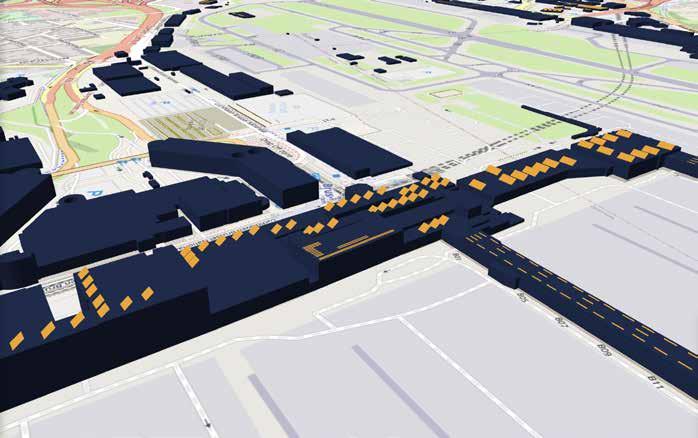

IES established a baseline to work with and then started experimenting. “It is all about testing out scenarios”, Aodh Maguire adds.

Adjusted landing procedures for less emissions and noise pollution Taxibot further reduces the emission of particulates


“What happens when the new electric heating plant is in place? What if we add extra photovoltaic units on a particular rooftop or replace the lighting system in a warehouse?” The model then predicts the outcome of those actions in the long term. And when new data is fed into the Digital Twin in the near future, the results of infrastructural adaptations will be there, in black and white on the screen.
“The next step is to get the people from Brussels Airport Company to work with the Digital Twin, so they can turn it into a live model they can consult anytime”, Giulia Barbano concludes. Thanks to its Digital Twin, Brussels Airport Company can now finetune its strategic decisions regarding sustainability.


Within Stargate, the Flemish Institute for Technological Research (VITO) is responsible for all UFP (Ultrafine Particles) measurements. After a large-scale measurement campaign at Brussels Airport, they meticulously mapped all sources of particulates emissions. Over the next few years, they will again carry out measurements for various Stargate projects to know exactly how much benefit these will yield. One of these projects is the Taxibot, a solution where aeroplanes no longer taxi using their own kerosene engines but are powered by an electric vehicle that resembles a standard pushback truck. In 2023, TUI fly Belgium, in collaboration with Smart Airport Solutions, made all the preparations for a test with the Taxibot, which is perfectly compatible with its own Boeing 737 Next Generation aircraft. “For the pilots, not much changes,” says Vincent Snauwaert, Public Affairs Manager at TUI fly, “because they still taxi to the runway themselves. Only a ground handler first connects the Taxibot to the nose wheel. Then, after the pushback, he hands over control of the vehicle to the pilot, who taxis with the help of the Taxibot.” Because the pilot only needs to start the aircraft engines near the runway, this means less fuel consumption, noise, and particulates.
In November 2023, the second test phase of an initiative started at Brussels Airport that increases predictability during approach for pilots. It aims to fly more and better Continuous Descent Operations (CDO) using the existing Required Navigation Performance procedure (RNP).
“To guarantee sufficient capacity for the approaching traffic, the air traffic control positions the aircraft into the axis of the runway. Sometimes the route is a bit longer, other times a bit shorter; all depending on the circumstances and other traffic at that time”, says Alexander Vanwelsenaere, Sustainable Aviation Manager at skeyes. “So even the most experienced pilots don’t know exactly which route they will follow in advance, which makes optimising their descent more difficult. By promoting the RNP procedure, we inform the pilots about
the exact approach route as soon as possible. By entering the information into their onboard computer, they can optimise their descent to the maximum.” The aircraft then emits less CO2 and NOx, which benefits climate impact and air quality. It also causes less noise pollution with a continuous descent, positively affecting the airport’s residents. The project is coordinated within the CEM working group (Collaborative Environmental Management), which features Brussels Airport Company, skeyes, Brussels Airlines, TUI fly, and DHL. An evaluation of this test will follow in the course of 2024.
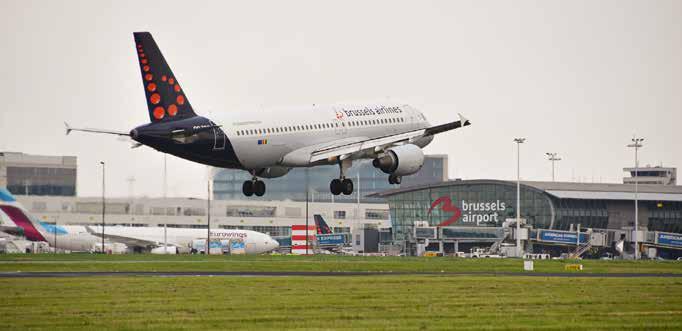
Brussels Airport Company has established the data mentioned in this GRI content index for the period 1 January to 31 December 2023 with reference to the GRI standards. The GRI Standards enable any organisation – large or small, private or public – to understand and report on their impacts on the economy, environment and people in a comparable and credible way, thereby increasing transparency on their contribution to sustainable development. Apart for companies, the Standards are also highly relevant to many stakeholders – including investors, policymakers, capital markets, and civil society.
2-9
2-10
and selection of the highest governance body www.brusselsairport.be/ en/our-airport/aboutbrussels-airport/in-a-nutshell 2-11
2-22
Compliance with
and regulations In 2023 we received no penalties for noncompliance with the legislation.
DISCLOSURE
Nitrogen oxides (NOx), sulfur oxides (SOx), and other significant air emissions NOx: 16µg/m³ NO2: 13µg/m³
Total energy consumption in % renewable energy 81,555.5 MWh / 3.5% (2,913.532 MWh)
Scope 1 (CO2-eq) 16,285 tonnes
Scope 2 (CO2-eq) 43.90 tonnes
Scope 3 (CO2-eq) 3,381,722 tonnes
CO2 reduction 67% reduction in direct CO2 emissions (scope 1 and 2) compared to 2010
Total amount of waste (kg) 2,700,000
% of waste recycled 29%
Tap water consumption in litres 284,000 m³ (terminal only)
Number of days of formal training per year 3
Gender ratio and breakdown by age 29% F / 71% M
Safety systems
Risk analysis, audits, annual action plan and global prevention plan
New policy statement
Safety training and disaster drill
Number of (fatal) accidents and number of lost calendar days
High-level safety systems, established according to ICAO and EASA guidelines, ensure safety at the airport.
Several Brussels Airport Company employees conduct daily risk analyses of existing or changing airport operations. Brussels Airport Company regularly undergoes audits to check that we operate in compliance with legal safety regulations. In line with the welfare law and the ISO 45001 standard, our welfare policy is based on a dynamic risk management system in which health risks are continuously identified and evaluated. A five-year global prevention plan and an annual action plan determine the main health risks in the workplace and define actions to prevent these risks.
The health crisis in our company led to temporary unemployment, insecurity, working from home and less contact with colleagues. Therefore, our new policy statement has a big focus on mental health. We want to be there for our people and care for each other’s mental health. Psychosocial risk assessments should help reduce the risk of burnout in our organisation.
Every two years, we organise a full-scale emergency exercise at the airport. Led by the governor of Flemish Brabant, it is part of the provincial emergency and intervention plan. It meets the safety requirements of EASA, which every international European airport has to meet.
Number of accidents 2023: 15 (vs. 15 in 2022)
Number of fatal accidents 2023: 0 (vs. 0 in 2022)
Number of lost calendar days: 546 days